- Destinations
- Travel Tips
- Travelwaka Tours
- Cheap Flight
- `Work With us
- Terms and Condition
- Privacy Policy


Travel to Benin Republic From Nigeria – All You Need to Know

Travelling to Benin Republic From Nigeria – All You Need to Know If you are planning to visit the Republic of Benin from Nigeria, this post is for you. It will cover everything you need to know about crossing one of the busiest borders in West Africa. It will also cover the cost, where to stay, places to visit etc. The Benin republic/Nigeria border is in a town called Seme. The Nigeria Benin border is popularly called the Seme Border.
Table of Contents
About the Republic of Benin
The Republic of Benin is one of the many countries that share a border with Nigeria. Other countries that share a border with Nigeria include Chad, Cameroun and Niger Republic. Benin Republic shares a border with Nigeria at Seme in Lagos State and around Idi Iroko in Ogun. Seme is a few minutes drive from Badagry. The country was formerly known as Dahomey. It was, however, renamed Benin in 1975.

The Capital of Benin Republic is in Port Novo. However, the most popular city in Benin Republic is Cotonou. It is also the economic capital of Benin Republic. The country was colonized by France. It got its independence on August 1, 1960. The official language of the Republic of Benin is French.
The Republic of Benin is home to pristine beaches, robust culture, wildlife, and beautiful tourist attractions.
Requirements For visiting Benin Republic from Nigeria
For Nigerians planning on visiting Benin Republic, the following are the requirements:
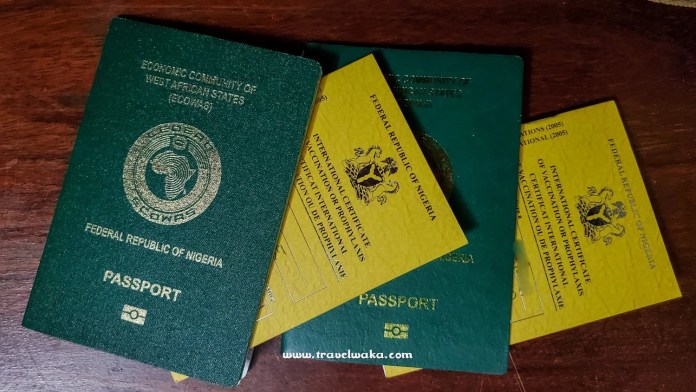
- Nigerian Passport: Nigerians visiting Benin Republic will have to present their International Passport at the border. The Nigerian International Passports is a document issued by the Nigerian Immigration Service.
- The Yellow Fever Card: The second requirement is the yellow Fever card. This yellow card is proof that you have received a dose of the yellow fever vaccine. The card is also for keeping records of vaccines required to visit other countries. You can only travel after ten days of getting the dose.
Also Read: How to Get A Yellow Fever Card
Vaccines To Take Before Visiting Benin Republic
Ensure you take these two vaccines before you visit Benin republic. If you do not, you will have issues with the Port health at the border. When you go for the yellow fever vaccine, ensure you ask them for Meningitis too. They will probably fix another date for that. These are the two basic vaccines you need to take before visiting Benin Republic.
- Yellow fever vaccine: This vaccine is to protect you against yellow fever
- Meningitis Vaccines:
The Languages
French is the official language. The other languages include Yoruba, Fon and a Gbe languages. These are the indigenous languages of the Republic of Benin. They are all considered national languages.

The official currency of the Republic of Benin is Cefa, it is also known as the West African CFA Franc. It comes in the following denomination. Coins 1, 5, 10, 25, 50, 100, 200 Notes: 500, 1000, 2000, 5000, 10,000, 20000
How to Get To the Republic of Benin Through Seme Border

If you are looking for stress-free access. You can get a direct bus to the Republic of Benin from Lagos. These are some major transport companies that visit Benin Republic Efex, ABC transport, Chisco Group Transport etc. They will handle the border protocols, the stamping etc. They offer air-conditioned buses.
However, if you are on a low budget or an adventurer like me, you can decide to do the stamping on your own. From Ikeja board a bus to Egbeda – 200 to 300 Naira At Egbeda board another bus to Iyana Iba – 300 Naira From Iyana Iba board a bus or car to Badagry – 500 to 700 Naira
Once you get to Badagry, get a bus going to Seme. Tell the driver you will stop at the border. Please note they may scare you that stamping is hard, do not mind them. Just ignore and tell them to stop you at the border. At the border, just walk straight into the complex. Ask for where to stamp, and do it yourself. Once you stamp your passport, you will go through another set of routine checks by Port Health who will ask for your yellow fever card. Then another routine check by the NDLEA and customs.
Depending on where you are coming from, if you are coming from the mainland around Ikeja and environs, you can go through Egbada, Iyana Iba axis. If you are coming from Oshodi, you may have to go through Mile
Crossing to the Seme Border
At the park, the driver may try to charge you to cross the border, just tell them to stop you at the border you will handle the border protocols yourself.
Once you are approaching the border’s small gate, flash your Passport, this will grant you entry into the premises and sometimes you may get questioned by the Immigration officers on duty. You can move to the point where you can stamp your passport. To stamp your passport, you will be asked pay some money. Well this should not be the case but it is what it is. For virgin passports, you will pay 1,000 or more depending on your negotiation power and for already stamped passports, you will pay 500 Naira.
Once your passports have been stamped, You will go through the Port health who will ask for your yellow fever card, then the customs who will also try to check your luggage, then the NDLEA who will also check for drugs and other forbidden substances, Once you are clear, you will move to the Benin side where you will go through another check.
Tips When you get to Benin
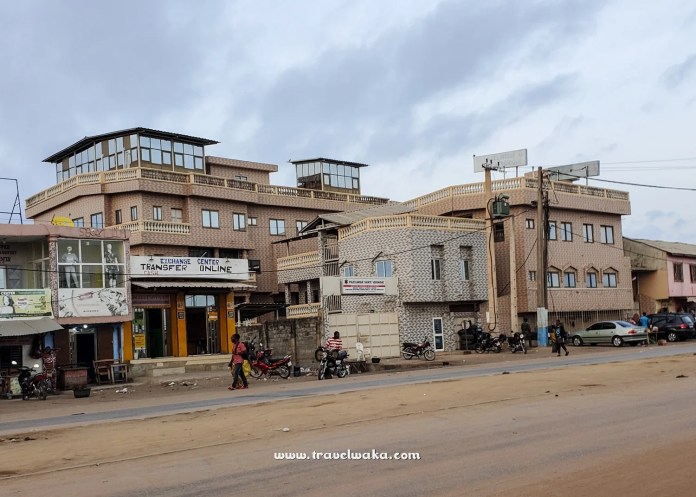
- Understand the Country: The first thing you should do is to understand the country, their currency, exchange rates etc. You should also know some basic laws of the country. Also, you should familiarise yourself with some of the beliefs and culture.
- Change your money from naira to Cefa: The first thing you should do is to change from Naira to Cefa. Please do not rely on your ATM card. It may not work there due to CBN restrictions.
- Keep Your Transport Fare: As a rule, ensure you have the transport that will take you from the border to your house stored separately. This is to avoid spending your transport fare when you travel. Please keep your transport fare separate from your other money.
- Get a SIM card: Nigerian networks don’t work over there unless you roam them. However, the network company will excessively when you make and receive calls. Therefore you may need to get a Benin SIM card. I will suggest either MTN or Airtel. Once you get that, you could load it up and activate internet connections, this will save you a lot of stress.
- Get a Universal Adapter: they use a different kind of socket different from the ones we have here. You need to get a universal adapter that will allow you to plug in your device. This is very important, it may be difficult getting one once you step out of the border.
- Get an English speaking driver: Look for an English speaking driver to take you to your destination. This will help you with the language barrier. If you are going to take another bus after getting to your destination, you may also tell the driver to help you out.
- Learn basic Vocabulary: You should learn basic vocabulary like bonjour(good morning), Bonsoir (good evening), Anglais (English). Etc

Things to Do at Benin Republic
- Enjoy the Street Food: The first thing you will notice when you visit Benin is the presence of street food vendors everywhere. Street food is popular here. Get adventurous and have a taste of the street foods.
- Visit the Python Temple: The temple of the pythons has become one of the major tourist attractions in Benin Republic.
- The Slave Route: This is the journey to the original slave route in Benin. You also get to see the door of no return. It is the place where slaves are shipped to Europe and other unknown destinations, never to return again.
- Visit the National Park: Benin Republic has a rich nature and wildlife experience. A visit to the National parks will blow your mind.
- Attend a Festival: The country has a rich cultural heritage, you should attend one of its cultural festivals.
- Visit the Beach: Benin Republic is a coastal country with different beaches. Enjoy the blue skies, the pristine beach sand and the beauties of its beautiful beaches.
The Cost of Visiting Benin Republic
Transport to Badagry Between 1,000 to 2,000 (depends on where you stay in Lagos) From Badagry to Seme 500 to 1,500 (Depends on whether you use a bus, car or bike) Crossing at the Border (between 1,000 and 2,500) depends on your negotiation power and if you are using a virgin passport or an already stamped one From Seme to Cotonou (1500 to 2,500)
Total – Between 4,500 and 7,000
Hotels In Benin Republic
Hotels are moderately priced in Benin Republic, the cost of a standard hotel in Benin varies from 6,000 Naira per night to 15,000. Though there are more expensive ones between 20,000 to 150,000 per night.
Hotels in Benin Republic
- Le Jardin Secret
- Diaspora Auberge
- Auberge de Grand Popo
- Hotel La Casa Cielo
- Hotel de la Diaspora
Tourist Attractions in Benin Republic
- There are so many tourist attractions in Benin Republic
- Zinsou Foundation Museum
- Pythons Temple
- Bab’s Dock
- Fidjirosse Beach
- The Cotonou Littoral Monument
Differences Between Nigeria and Benin republic
Roads: Benin republic has far better roads than Nigeria can ever imagine. All the major highway are tarred. Throughout my stay, I did not encounter a single pothole in the places I visited. This is not an exaggeration, all the major highways are tarred.
Amenities: They have basic amenities like good roads, street light, water etc.
Development: In terms of development, Nigeria is far more developed than the Republic of Benin. It is rare to see a new major construction around the city.
Data: Internet Data is pretty expensive here in the Republic of Benin compared to Nigeria.
Road signs: There are road signs on every street, every highway.
Driving: Driving here is too sane that I was almost freaking out. LOL.
Cars: There are more exotic cars in Nigeria than in the Republic of Benin. I hardly see the latest cars around.
Transportation: Most of the citizens own bikes, bikes are one of the popular means of transportation in this country. It is also very common to see women riding bikes.

SUBSCRIBE , GET UPDATE ON OUR LATEST POSTS!
You’ve been successfully subscribed to our newsletter!

62 COMMENTS
[…] have read several stories about different issues people have had in the Republic of Benin and Ghana. One of the popular stories was shared by Derende here […]
Wow this was really helpful
Glad you found this helpful.
may God bless u, please I stay in iyana iba and is not possible to go and board a flight again to cotonou all because I want to stamp my passport from nigeria airport and cotonou Please hw can I stamp my passport for out in Nigeria and Entering in cotonou? thanks ??????
You do not need to visit the airport to get your passport stamped, You can get your passport stamped at the Seme border.
Thank you so much for the update ? But I have a question to ask. I want to know if it’s mandatory to quarantine for fourteen days in Cotonou? Because I traveled from Nigeria to Cotonou on 23rd of August and I’m planning to leave for Dubai on 1st September. Is there any possibility for me to embark on the journey? Secondly will I be quarantined in Dubai? Thanks in anticipation. Yours sincerely, Okonkwo Ugochukwu.
Yes, you are required to stay for 14 days in Benin before travelling. You will also undergo another test in Dubai. You do not have to quarantine in Dubai once you tested negative.
How can I get the passport firstly because am planning to go to there
ESTHER. from lagos Nigeria planning to go to benin republic.pls do you know how much their house rent cost
please, where do I get a yellow fever card? I only have my passport and I am travelling in a few hours?
Here is a tip on how to get a yellow fever card in Nigeria. https://www.travelwaka.com/tips-for-obtaining-a-yellow-fever-card-in-nigeria-simple-easy-steps/ If you need it fast, kindly send a message via our contact form or through instagram @travelwaka_tours http://www.instagram.com/travelwaka_tours
Go to Nigeria port authority
You meant Port Health not Nigerian Ports Authority
Please can I cross without the yellow card. I only have my international passport.
The yellow fever card is requirement to visit Benin Republic, however, it is not a requirement for visiting Dubai.
Hey good day .. This article was really helpful.thank you so much. Please I want to ask. I got admission in a university in Cotonou and I am flying in tomorrow and I just noticed you said something about fever card. I don’t have that. Does this mean I won’t be allowed to pass the boarder
You might have issues with the Port Health guys at the Airport, they might not allow you to board. If you can get the card today please do, even though you are supposed to get this card minimum of 10 days to your travel date. Kindly reach out to us if there is anything we can do yo help you out.
hi Greetings..pls is there direct flight from lagos to cotonou.. en which airline. thank you
Yes there are direct flights from Lagos to Benin Republic but it is always hard to find.
Good day. en Greetings please I have an appointment at de Nederland Embassy in November 2021 in cotonou. I intend to take a bus…my question is do they do a covid 19 test at the border.. or at airport b4 entry into benin ..
If you are travelling by Air, You need a covid test , If you travelling by road you do not need a covid test. You can take a bus at Yaba or Mile 2.
[…] Also Read – Travel From Lagos to Cotonou By Road […]
We are going from Nigeria to Benin by bus. Do we need a covid test to enter Benin and to reenter Nigeria? My husband and I are fully vaccinated. And are yellow fever vaccines a major requirement now?
You do not need a covid test if you are travelling through the land borders.
Please we are like 20 people going to Cotonuo for introduction and we want to take a car from Nigeria to Cotonuo what exactly do we need to take Nigeria car across the border?
You need your international passport and yellow card
Thank you for this! What type of visa would a Nigerian need to stay in Benin Republic for 6months to a year? I have an international passport.
You do not need a visa to visit Benin Republic. However you have a limited time you can stay in the country
please i am currently processing my international passport, can i use my ecowas certificate alone to travel to cotonou
You should be able to travel with that.
I’m planning to to travel there by December, is it ok if I get the yellow fever card now
How does one become a resident of Benin? Is there a long wait?
Not really. Benin Republic is visa free for Nigerians and other west African countries
What are the steps for someone to get a residence card?
Please I don’t have a yellow fever card,is there any means of going in without that
Processing a Yellow card is easy, here is how to process a yellow card in Nigeria https://www.travelwaka.com/tips-for-obtaining-a-yellow-fever-card-in-nigeria-simple-easy-steps/
I DNT have passport and d yellow card , just want to go spend two days in cotonou, how can I make pls without the passport and yellow card
I have same questions to ask him I want to visit the point of no return and some other place just for two days
You can, the point of no return is in Badagry, you can stop over, then proceed to Benin Republic where you can also visit the door of no return,
Same here ! Planning a trip in December for sightseeing .. strictly 2 nights . Your post been helpful
Glad it was helpful
I don’t either of this two yellow card and pastport I just want to spend two three days tour .is it possible sir? God bless you for the update … But I have my national I’d card
If you must visit Benin, you need an international passport and a yellow card.
Please I’d like to know if my kids will need an international passport and yellow fever card to travel to Benin republic
All Nigerians require an international passport to travel to Benin
Please my own concine is that what documents do I need to open a Bank account in Benin republic
Not sure about that but it should be almost the same requirement with that of Nigeria
Hi, Is a COVID-19 vaccination certificate required to go to Cotonou now? What of Meningitis? We have all the other documents and cards. Thank you.
If you go through the borders, its not an option but they will definitely ask.
Is COVID-19 certificate still compulsory to take along to Benin Republic if someone is traveling by flight?
Is COVID-19 certificate still needed to travel through flight?
Hello please I really need to ask you a question I’m having this document wish I need to carry my sister To Italy please I just need a stamp on it that she’s was already in Nigerian then Bord the next flight again to come to Italy please I really need help inside the airport who can do this for me please if you have any contact please let me know
ESTHER pls how much is house rent in benin?
It depends on the type of house that you want and the area
how much is house rent in benin
Hiii. I want to rive there. How do i do it? what do I need to carry along with me?
Hi . Thanks for the information. Is it international passport I need or Ecowas passport?? Will love to go with my family
Please, is it possible for someone to visit Nigeria from Benin Republic without an international passport and or visit Benin Republic from Nigeria without an international passport. Maybe using Nigeria national id printout with yellow fever card.
God has putting it to your mind to be of help to people… May God bless you as well…
Pls, I want to go to Benin Republic…and I have my Int’l Passport… Just to spend a month there????. Pls, can you helpfully suggest how much i need to hold that would be enough for me for whole one month…together with transportation and documentation…(?)
You’re a very good blogger. Keep it up!
What do you think? Leave a Reply Cancel reply
MILESANDWAVES.COM
DIY Travel Blog
- Destinations
How to Travel for Vacation to Bènin Republic from Nigeria on a Budget

Do you know that it is possible to travel to Bènin Republic from Nigeria for a one week+ vacation, and spend less than N200,000 even after visiting several exciting places?
I started planning for a vacation to Bènin Republic whilst on vacation in another country to celebrate Valentine’s Day and my girlfriend’s birthday. * Flips hair* . My account was probably red, * coughs*, but my visit to Bènin Republic was memorable and totally worth emptying my account for. I spent 8 days and 7 nights in Bènin Republic, and my total expenses was roughly N153,000.
If you want to know how, keep reading because in this article, I am going to give you a cost breakdown of all my expenses sequentially.
What's covered in this Post
Transportation to Seme-Krake Border
My first stop from Lagos to Bènin Republic was at the Seme-Krake border. There are different routes to get to the border but the easiest for me was through Mile 2, Lagos.
I like to travel early, so, my friend and I arrived at Mile 2 at 6am and got a cab going to the Seme border. The cab takes 4 passengers and each person paid 7,000 to the border. If you want to drive directly to Cotonou, there’s a separate cab and that costs 20,000.
We left at 7am and arrived at the Seme border at 10am. Asides the 1,001 checkpoints on the way, it was a smooth drive.
Stamping our Passports
We proceeded to the immigration to stamp out our passports. You have to first stamp out of Nigeria then proceed to the Bènin Republic Immigration to stamp into Bènin Republic.
Stamping at the Nigerian immigration costs N500. But if your passport is a “virgin passport”, i.e., it has not been stamped into Bènin Republic before, you’ll pay N1,000. It was the first time for my friend and I, but we negotiated and paid 500 each to get our passport stamped.
At the Bènin Republic border, the immigration officer said we were to pay 1,000 CFA. We didn’t have CFA on us, so we requested of him to collect N1,000 for each passport instead and he agreed. We stamped our passport and crossed out of the border on foot. This was about a 3-minute walk.
Changing our Naira to CFA
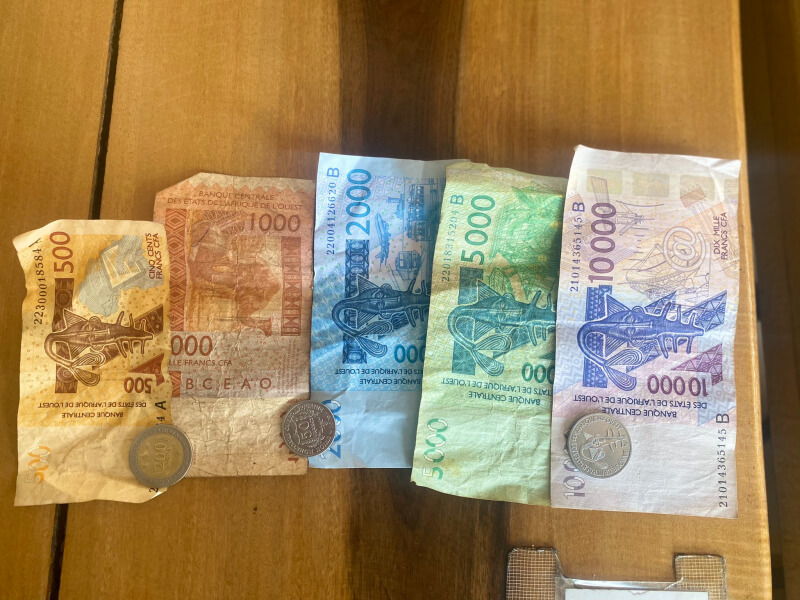
The currency used in Bènin Republic’s is called West African CFA Franc (CFA for short). They have notes as high as 10,000 and still make use of coins.
Immediately we crossed out of the border, I brought out my phone and made a video. I was giddy with excitement already. After that, I proceeded to find a money changer. I was shocked at the exchange rate. See, the Naira is not falling. It has fallen. CFA is currently higher than Naira!
We checked a few money changers and found one who agreed to change N1,000 to CFA 850, with cash. But for transfer, his rate was CFA 750 for N1,000. I changed $100 then an extra N50,000. $100 gave me 65,000 CFA, while N50,000 gave me N42,500. So in total, I had 107,500 CFA. As soon as I collected my money from the exchanger, I felt like I had finally arrived. * DJ, play Big Baller by Flavour for me !*
I strongly advise you convert all the money you’ll need for your stay in Bènin Republic at the border. If you have any CFA left after your vacation, you can convert it back to Naira when going back to Nigeria.
Please note: This was the exchange rate when I travelled. Naira has been losing its value at an alarming rate lately. Please, before traveling, do a quick Google search to know the latest exchange rate and take even more money than you think you’ll need.
Cost of Transportation into Cotonou
After changing our money, my friend suddenly said, “Esther, I think we should start our adventures by going into Cotonou with a bike instead of a cab”.
I agreed and we boarded separate bikes to take us to our accommodation in Cotonou. It’s good to know that their bikes come with a helmet. It was a 45 minutes ride to our accommodation and it cost us 800 CFA. If you’re not a fan of bikes, you will find cabs that go into Cotonou close to the money changers.
Accommodations in Cotonou
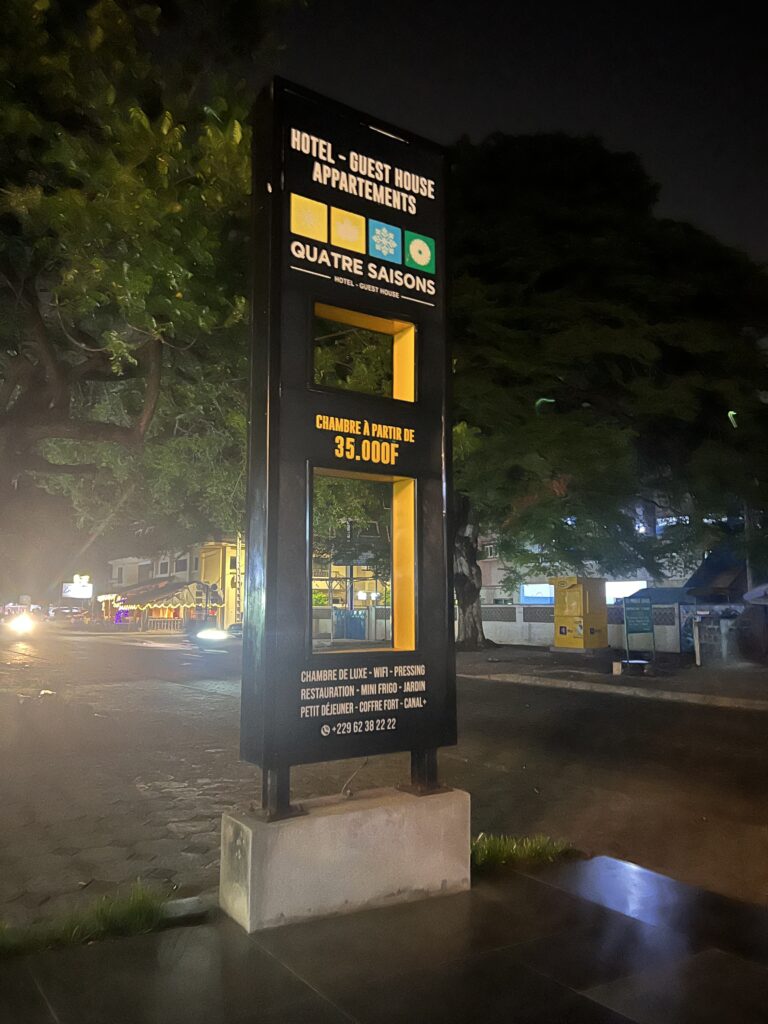
The decision of where to stay, reservations and places to tour were planned ahead. I’m a budget traveller and planning ahead saves me money. So, if you’re looking to travel more in 2024, always plan ahead. Spontaneity is for the rich.
There are different types of accommodations in Cotonou. I’m a hotel and resort travel girl because there’s no way I want to be cooking on a vacation. There are hotels of different prices, ranging from 10,000 CFA to as high as 200,000 CFA. If you’re a lover of Airbnb, then check Airbnb website for options.
I stayed 6 nights at Hôtel Saint Louis. Their rooms go from 12,000 CFA ($15) to as high as 30,000 CFA ($35). But as a good negotiator, I negotiated for us to pay 10,000 CFA ($12) per night for the 12,000 CFA room. (Ask and you shall be given😊.) In total, we paid CFA 60,000 for the 6 nights.
We spent the 7th night of our stay in Bènin Republic at Azalaï Hôtel de la Plage and it cost us about $100 to lodge there. (This was the only thing we spent much on, just because we wanted to have a luxurious hotel experience).
My accommodations were in the city centre. This gave me easy access to the beach, tourist attractions sies, food spots and lounges.
There are some beautiful hotel options in Cotonou I recommend you explore depending on your preferences.
- If you love beachfront hotel and you’re on a budget, try Le Hublot Hotel.
- Toho Cabapapa offers nature-inspired accommodation experiences worth exploring.
- Check out Limprevu Cotonou if you love aesthetic accommodations.
- If you want to pamper yourself and you don’t mind splurging a bit, then go for Azalaï Hôtel de la Plage.
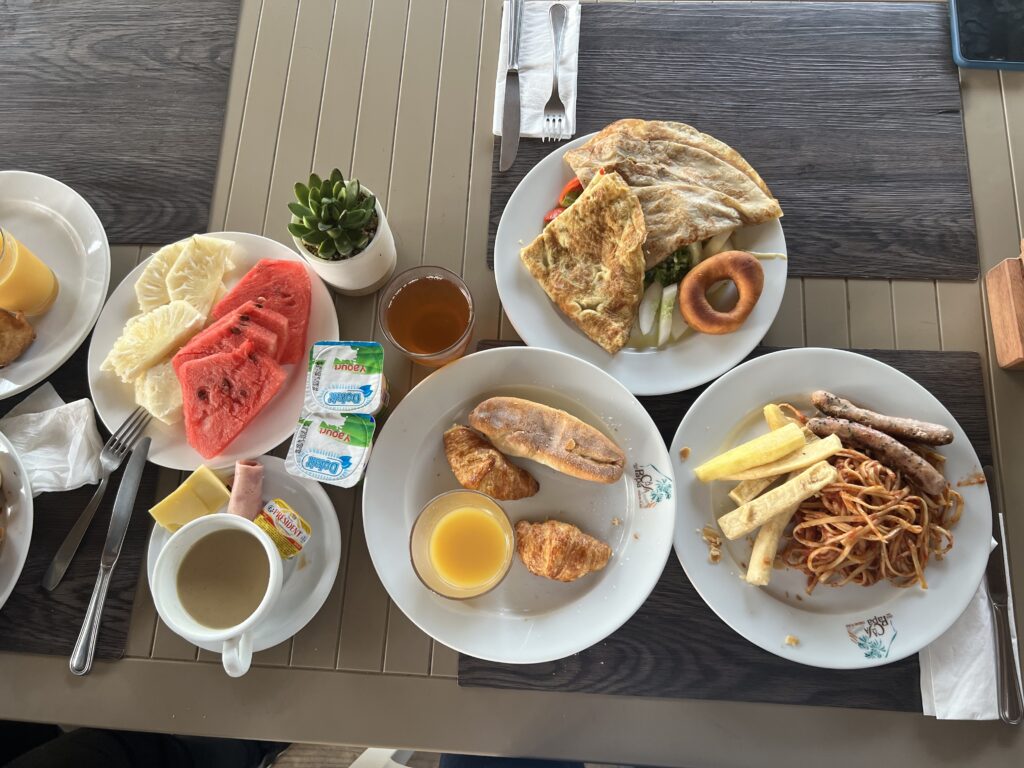
Touring Bènin Republic: Places I visited
Bènin Republic is a breathtaking country and its people are hospitable. Since after my visit, I have been wondering why people seldom talk about going there for vacation. I spent 8 days there, yet there are several beautiful places I couldn’t get to visit.
Below are some of the places I visited.
The Beach:
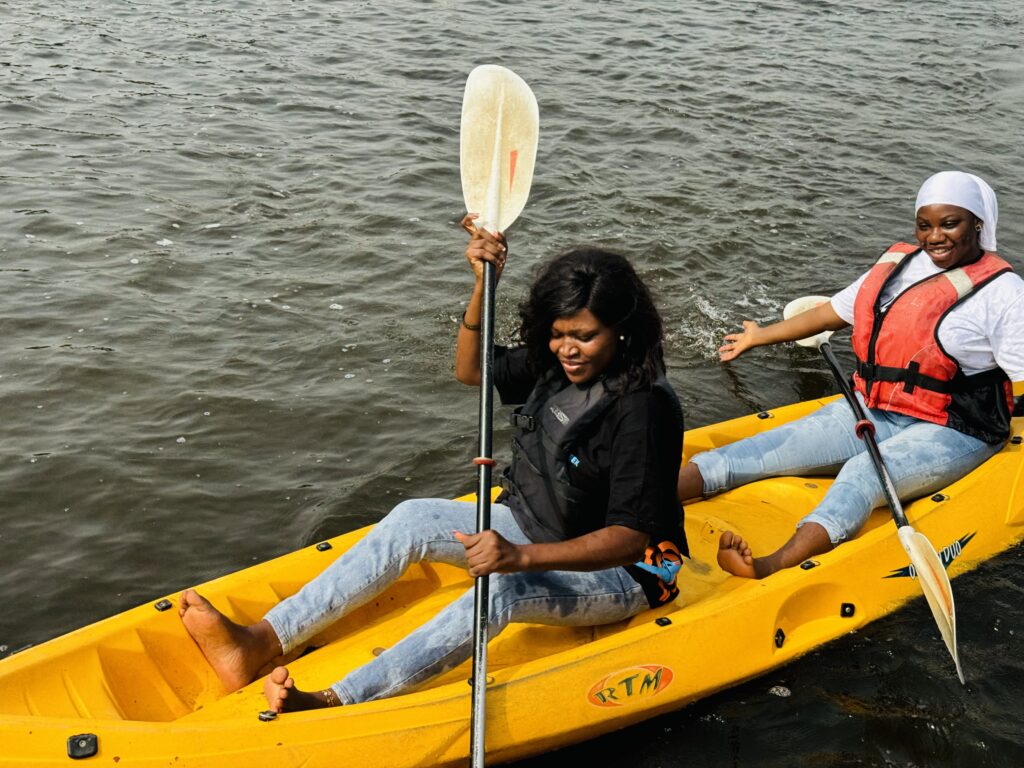
The beach is the main character in this country. It is clean, calm, and almost all of them are free to access. You’ll only be asked to buy some refreshment if you want to stay there.
I visited Fidjrosse beach in the evening on the day of my arrival and I didn’t want to leave. It was breathtaking!
Other beaches you could visit are the Cali Cali Beach and Obama Beach.
Graffiti Wall:
Fun fact about this wall- the mural on this wall was created by 40 professional graffiti artists from different countries.
The graffiti wall is close to the beach. So after my time at the beach, I took a walk to view all the paintings and take some pictures. You should check this wall out.
Amazon Statue:
This statue is a historical emblem. It was raised in respect to the women of Dahomey.
If you’ve been to Bènin Republic and you didn’t go to see the statue, I dare say your trip was incomplete. You need to go back.
Cornetto Ice Cream:
This is an Italian ice cream shop I completely recommend. After eating the ice cream there, I understood why DJ Cuppy sang that she’ll take someone to Italy just to have some gelato😅.
Artisanal Market:
If you want to buy beautiful souvenirs in Bènin Republic, then this place is a must visit.
Notre Dame Cathedral
This cathedral has a peaceful ambience. If, during your vacation, you need somewhere quiet to pray or meditate, you should get on a bike/ cab and come here.
Restaurants

I also visited Bangkok Terrasi and Good Taste restaurants. Both restaurants are great. What I particularly liked about Bangkok Terrasi is that, although its a fine dining restaurant, the food prices were not ridiculous.
Good Taste restaurant was a good place to get local dishes. The taste of their food and their service were commendable.
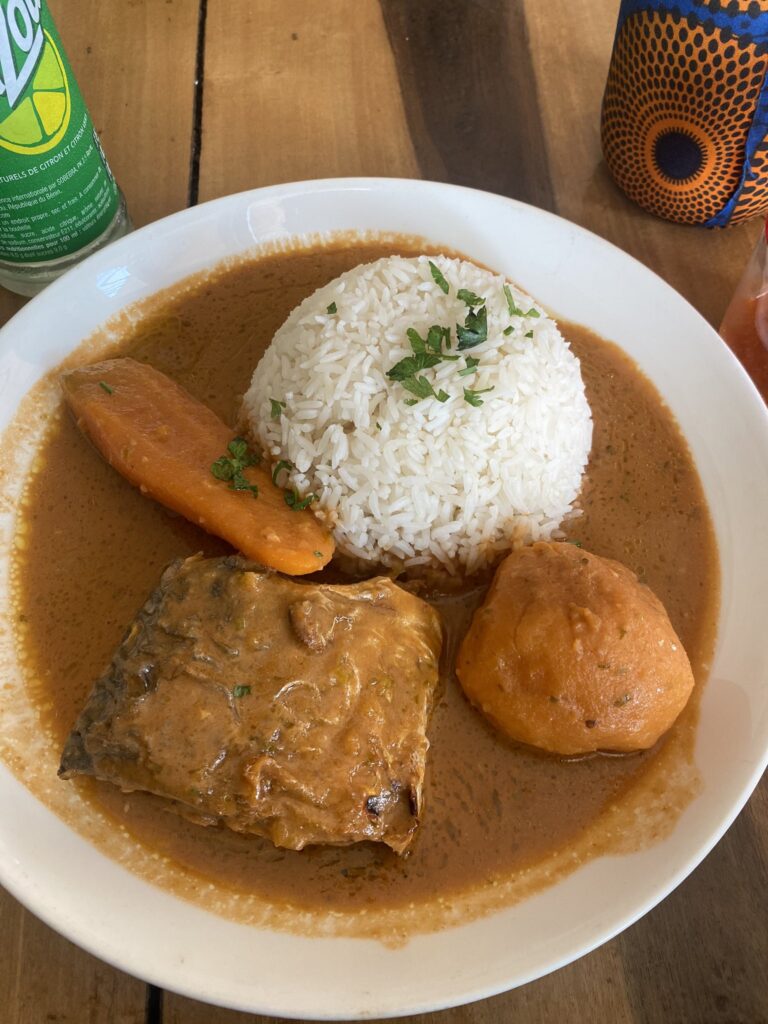
Overall, I was happy with all the places I visited and things I did during my vacation in Bènin Republic.
Cost breakdown of how much I spent to travel to Benin Republic from Nigeria
Below is a breakdown of how much I spent during my vacation. Some of the expenses were shared with my friend that I travelled with.
Disclaimer: This was the total amount I spent when I travelled. Currency exchange rate isn’t stable. Like I said earlier, please check the current rate before traveling.
What You Need to Know Before Visiting Bènin Republic
Let me share a couple of things I think you need to keep in mind and prepare for before visiting Bènin Republic based on my experience.
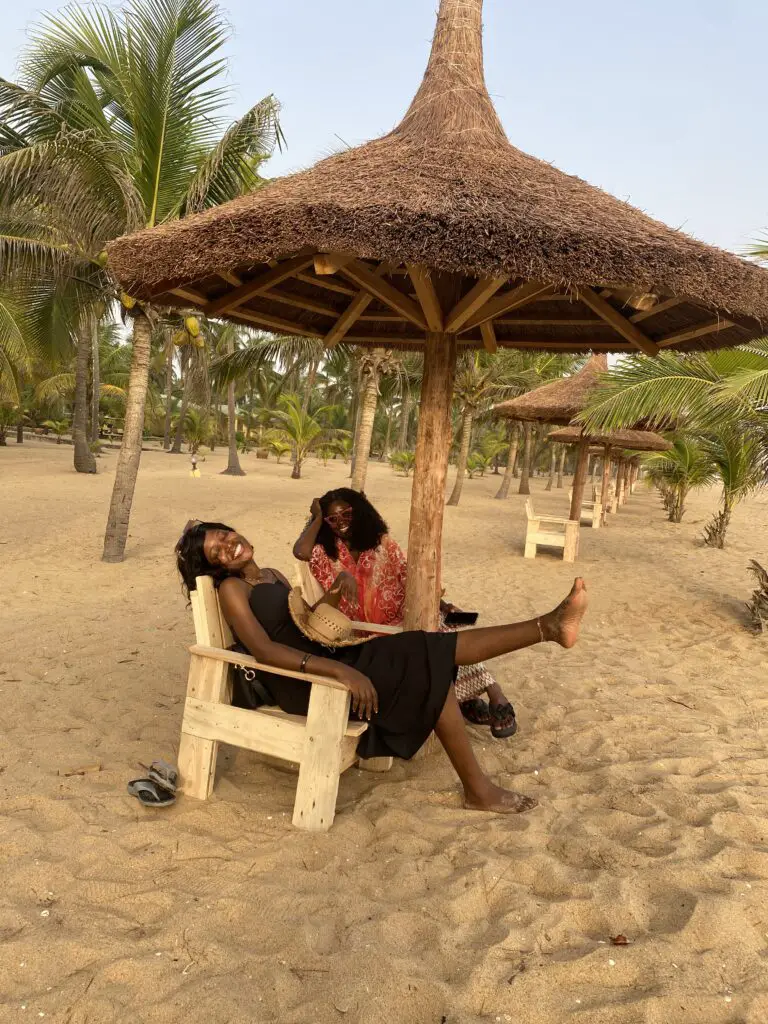
📌 As a Nigerian passport holder, you don’t need a Visa to visit Bènin Republic. It is one of the 28 visa-free countries you can visit as a Nigerian.
📌 Bènin Republic is a French speaking country. If you took your French classes in high school serious, bien pour vous . However, for those like me who don’t understand French, there’s something for you- Google Translate!
All I did was download Google Translate from my App Store (also available in playstore) then download French to use offline. Super easy! Please download this before travelling. This is important because when you arrive Bènin, you won’t have access to the internet till you get a sim card.
You may meet a couple of people who speak Yoruba in Bènin Republic, but I won’t encourage you to think of this possibility as a back up to getting Google Translate.
📌 You’ll need a universal charger. The electrical sockets in Bènin are not the same as Nigerian sockets. They are European rounded two-pin sockets, so pack a universal adapter. I bought mine for N7,000 from Ajalastore on Instagram and it’s useable in over 12 countries.
📌 The country is safe! I’m extra careful when I travel, so when I say Bènin Republic is safe, it is. I fulfilled one of my childhood dreams of going on late night walks in Bènin Republic- just to tell you how safe I felt there. I didn’t have to look over my shoulders wondering whether someone was about to snatch my phone.
However, as much as Bènin Republic is safe, I would advise you to use these security tips:
- Always share your current location with a friend or family.
- If you’re travelling solo, don’t give out your live location to the public and don’t tell strangers where you are staying.
- Only board bikes with the government apron that’s lemon green in colour. Bikes with this uniform have numbers assigned to them.
- Download an offline map: As a female traveller, I like to be extra safe when travelling. So an offline map helps me to know if we’re going to the right destination within the country.
If you have any other security tips, please share them in the comments section below.
Read also: 10 Benefits of traveling alone according to regular solo travellers.
Overall, the country is safe for solo travellers, couples and family trips.
📌Always change your money at the border. You’ll get better rates there. Be willing to check different exchangers in order to get the best rate.
📌Buy a sim at the border: This costs 1,500 CFA. I got MTN and it worked well.
📌Don’t try to convert the money to Naira before spending. This would hinder you from enjoying so many beautiful things. Bènin Republic is generally affordable, the exchange rate only makes it seem expensive, so enjoy yourself.
📌It’s completely okay to negotiate prices in some locations in order to get a good deal. There’s nothing embarrassing about haggling.
What do you need to go to Bènin Republic from Nigeria?
As a Nigeria, you need the following documents to visit Bènin Republic
Nigerians need a valid Nigerian or ECOWAS passport (ECOWAS travel certificate) to cross the Bènin Republic border. You can get an ECOWAS passport at any immigration office for N25,000. Because the process is manual, you can get it within 3 hours. (I heard that if you are going by boat, they’ll only ask for a valid ID.)
Read also: How to get ECOWAS travel certificate.
I travelled to Bènin Republic with my international passport, so I didn’t need the ECOWAS passport. I recommend using your international passport instead and I’ll tell you why shortly. Meanwhile, I can feel someone is about to write, “You can visit Bènin Republic without a passport” in the comments section. That’s true. But if you are the one, please resist the urge to😂.
As a Nigerian with a Nigerian passport, I intend to visit countries outside Africa soon and to visit these countries, I’ll need to apply for a visa. To reduce my chances of getting my visa rejected and save my fragile heart, I’m building my travel history by visiting visa-free countries.
So, if you’re like me and visiting other countries is your dream too, please, travel with your passport, and get it stamped so that when you apply for visa, the immigration officer will know you have a good travel record. Girl math.
Read also: Step-by-step guide on how to apply for your Nigerian passport.
Yellow Card
This is a compulsory travel document that shows you’ve been vaccinated for yellow fever. You can get it done at any port health centre in Nigeria. If you’re in Lagos, you can get yours at the Port Health centre along the Airport Road, right beside the tollgate. This costs N2,800 (at the time I did mine).
What to Pack When Traveling from Nigeria to Benin Republic for Vacation
Below are things I packed for my vacation. I didn’t pack much as I was going to stay for a few days and I like to pack light.
- Travel Documents:
These were my passport and yellow card.
- Clothes and footwear:
I start packing for a trip at least 2 weeks ahead of the trip so I don’t forget anything. I packed some pair of trousers, t-shirt, beach dress, skirt, belt, sneakers, and flip-flops. The climate in the Southern parts of Nigeria, such as Lagos, is similar to Benin Republic’s. So you can wear the same thing you wear in Nigeria here. You don’t have to shop for new clothes- except you want to.
- Antidiarrheal medicine
When I travel, I don’t go looking for Nigerian meals. I try out different cuisines, from Asian, to Ivorian, to local delicacies and snacks etc. So, this medicine comes in handy in case I eat something my system does not agree with.
- Snacks for the road trip. Calories don’t matter on vacation, you’ll burn them when you return😂.
- Take sunscreen because it feels like Bènin Republic is closer to the sun.
- Universal charger/ travel adapter.
FAQS on How to Travel to Bènin Republic from Nigeria on a Budget
Can i travel from nigeria to bènin republic without passport.
Yes, you can.
How many hours is Lagos to Bènin Republic?
Ceteris paribus, it should take you less than 4 hours to get to Bènin Republic from Lagos.
Can you use your Nigerian ATM card in Cotonou?
No, it’s no longer accepted in Benin Republic. You have to pay in CFA.
Can I travel to Bènin Republic from Nigeria on a Budget?
Yes, you can and I hope this article has provided a practical breakdown of how you can do this. Most of the things that cost a lot of money when visiting another country are cheap or free in Bènin Republic.
For example, you don’t need to apply for a visa as a Nigerian. Accessing the beaches and most of the tourist attraction sites is free/ cheap. All the sites I visited were FREE! You’ll spend about the same money you’ll spend in Nigeria on accommodation, feeding, transportation, etc. Most importantly, the Naira to CFA exchange rate isn’t as high as changing from Naira to the currency used in most other popular travel destinations.
So, if travelling out of Nigeria has been on your mind for a while, what’s your excuse now you know you can travel to Bènin Republic on a budget?
Have you visited Bènin Republic from Nigeria lately? Please share your travel experience in the comments section below. I would love to read from you.
2 thoughts on “ How to Travel for Vacation to Bènin Republic from Nigeria on a Budget ”
- Pingback: How to Get ECOWAS Passport in Nigeria – MILESANDWAVES.COM
- Pingback: How Much You Need to Budget for a 2-week Vacation to Ghana from Nigeria – MILESANDWAVES.COM
Leave a Reply Cancel reply
Your email address will not be published. Required fields are marked *
Save my name, email, and website in this browser for the next time I comment.
Related Posts
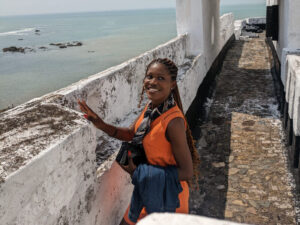
How Much You Need to Budget for a 2-week Vacation to Ghana from Nigeria

Hidden Gems: 5 Unexplored Holiday Destinations for Nigerians
You may have missed.

How to apply for Morocco Visa from the UK with your BRP
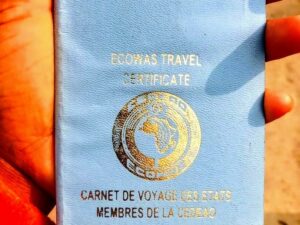
How to Get ECOWAS Passport in Nigeria

Nigerian Foodstuffs to Pack When Travelling Abroad
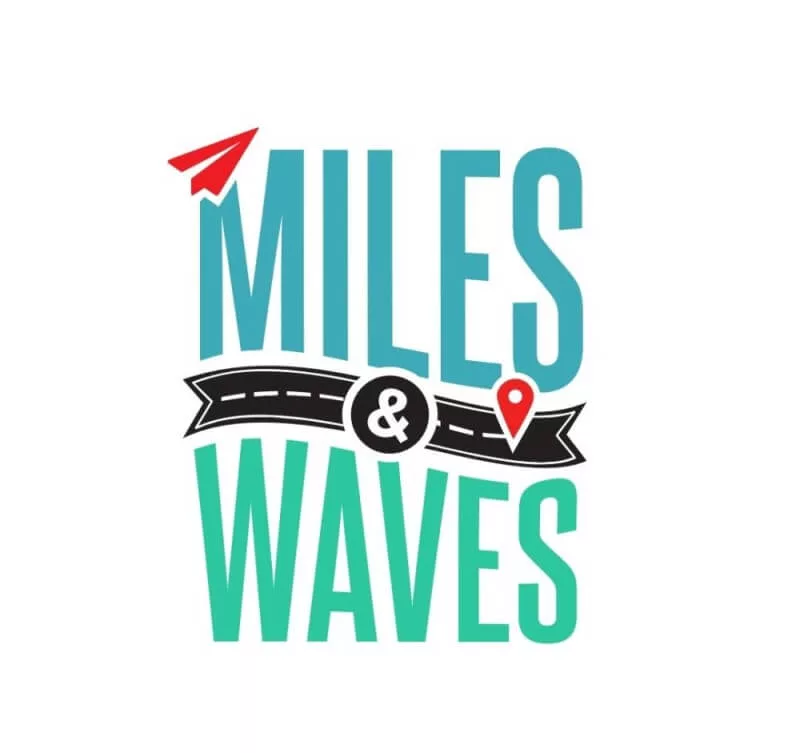
Never miss out on exclusive community-member benefits.
Thanks, I’m not interested

Travel and Tour. Experience the Culture

A Weekend Guide to Benin Republic – Everything you need to know
Disclaimer: This page contains affiliate links. If you end up booking a trip, I earn a commission at no extra cost to you!
Have you ever planned a trip with a group of people that didn’t happen? Probably.
In the last 2 years, I planned three trips to Benin Republic, none of which left the group chat.
So, in May of 2023, I joined a group trip to Benin and spent 4 days with 6 strangers. It was the best decision I made. We visited 2 cities, stayed in bucket list accommodations, and forged new friendships.
If you’re thinking about visiting Benin Republic, keep reading. This is a weekend guide to Benin Republic with information about activities to do to and more.
In this post
A weekend guide to B enin Republic – getting there
For me there are only two ways to get to Benin Republic from Nigeria and that’s by road or boat. I’m not including flying as an option because it’s ridiculously expensive so, here are the two ways broken down:
There are two land borders in Lagos – Idi-Iroko in Ogun State and Seme – Krake 30 minutes from Badagry. I took the Seme-Krake border because it was more accessible from my point of departure. So, keep this in mind when planning your trip.
To get to these borders, you can either go by public or private transport. Private transport is best in a group but could cost u pwards of N50,000 for a one-way trip .

However, if you’re on a budget, you can split the costs with your co-travellers – it’s also safer. I went with a group organised by Tripscove so transportation was very affordable.
On the other hand, if you’re departing from Lagos mainland, you can get a shared vehicle at Mile 12 to the Seme border for N20,000 and below.
Private vehicles, give you the luxury of being dropped off at the doorstep of your Benin Republic accommodation. Unlike public transport where you are dropped off at the border and have to find your way into Benin.
Public transport is more of a hassle but significantly cheaper if you’re travelling solo.
Also, transport companies like God is Good (GIG), Chisco, ABC Transport, and GUO frequently travel these routes, check they websites for prices and travel times.
The journey from Lagos mainland to the Seme border takes about 3-4 hours (sometimes longer) and another hour from the border to Cotonou mainly because of the bad roads and multiple police stops.
Tip: As a solo female traveller, I wouldn’t recommend going solo to Bénin by road especially if it’s your first time. There are over 20 police stops between Badagry and the Seme border and they are very suspicious of female travellers.
Full guide to travelling from Lagos to Benin Republic by road
If you’re looking for a bit of adventure, you can go to Benin Republic by boat. It’s a 3-4 hour boat ride, lifejackets are provided and there are navy and immigration checkpoints along the way.
You can get a boat going to Porto Novo from Liverpool Jetty in Apapa, CMS Jetty, and Maza Maza Jetty in Mile 2 and prices range from N4,000 to N7,000 one way.
Related travel guides:
- Ultimate guide to exploring Ghana
- UAE travel guide – what to see and do
- 10 day Kenya travel guide and itinerary
A weekend guide to Benin Republic – entry requirements
If you’re a Nigerian planning to travel to Benin Republic, there are a few entry requirements you need to be aware of:
- Nigerians need a valid international or ECOWAS passport to cross the Benin Republic land border. You can get an ECOWAS passport at any immigration office for N25,000 and you can get it in under 6 hours. You will also need to pay an extra N1,500 – N3,000 to have your passport stamped at both the Nigerian and Benin borders.
- If you’re going by boat, all you need is a valid ID.
- You will also need to present your COVID-19 and Yellow Fever vaccination cards to pass through immigration.
To get your Yellow Fever vaccination first register and pay N2,000 online and print the payment confirmation. Take the payment confirmation and a printed copy of your passport bio page to the nearest Port Health Services office where you’ll be administered the vaccine and given the vaccine card.
Please research before travelling because entry requirements are constantly changing.

LIKE THIS? PIN IT!
Safety in Benin Republic
I felt free and safe in Benin, even at night. The cities are well lit, the roads are free of potholes and there’s no traffic. People walk the streets freely at all times of the day and night without any fear which made me very comfortable.
Of course, you still need to take the necessary safety precautions especially if you are a solo female traveller. You should always be aware of your surroundings.
TIP: Always stay safe with Travel Insurance
I use SafetyWing whenever I travel because it is travel medical insurance created by nomads for nomads. You can buy a policy for the duration of your trip and end it when you want; it is also extremely flexible. Check out their website and get travel insurance for your next trip!
A weekend guide to Benin Republic – getting around
It’s very easy to get around in Benin. The ride-share app Gozem is widely used, safe, and affordable (costing anywhere from 1000 CFA upwards) w ith multiple vehicle options like motorcycles, and taxis.

For public transportation, t here are public taxis or buses for intercity trips and zémidjans (motorbikes) within a city.
Best time to visit Benin Republic
The best time to visit any country depends on what you want to see and do during your trip. Here is a little insight on the best times to visit Benin Republic based on different factors.
November to April is peak travel in Benin. This is the dry season and holidays like Christmas and Easter fall in these months so although the weather is favourable, this is when the country is the most crowded and prices are at their highest.
Months outside these are less crowded and cheaper but prepare for some rain.
Currency in Benin Republic
The West African CFA Franc is the local currency, and the exchange rate is N1,000 – CFA 724 . You’ll get the best rates in Cotonou (not at the Benin border). Transfers are worth more than cash so if you can, don’t change too much Naira in cash because you’ll be losing money.

*When I travelled in May 2023, the exchange rate was N1,000 – CFA 825 so everything I spent was at this rate.
Language in Benin Republic
French is the official language of Benin Republic. If you want to communicate with the locals, learn a few words and phrases and have your Google translate on standby.
French phrases to learn:
A weekend guide to benin republic -staying connected.
Even though there is free wifi in restaurants and public spaces like malls, I‘m an advocate for getting a local sim. It’s important to always remain connected in a foreign country, especially if you are solo.

I bought an MTN sim from a local vendor in Cotonou on my first day for N1,500 (1000 CFA) and 1.5 GB for N2,500 (2000 CFA) of data which lasted for 3 out of the 4 days I was in Benin.
A weekend guide to Benin Republic – where to stay
Accommodation hunting is one of my favourite parts of planning trips because travelling gives you the opportunity to experience different kinds of stays.
On this trip, we stayed in 3 different types of places, a boutique hotel, a beach resort and a lake house – each one better than the last.
In Benin Republic, you can find every type of accommodation for all budgets.
La Casa Cielo – Cotonou

This was our first stay, at a hotel in Cotonou – La Casa Cielo. We spent 1 night in this boutique hotel in the heart of Cotonou – the perfect introduction to Benin. It was right opposite the beach and had a stunning view of the coastline.
The decor of the hotel was pretty standard and modern which is something I often look for in my stays.

I stayed in a standard pool-view room which was $117 a night. The amount we paid definitely did not match the services we were promised. The room was pretty simple, but comfortable however, the bathroom was a bit odd. It was HUGE, about double the size of a regular bathroom with so much unused space. The Wi-Fi in the hotel was also quite weak.
For breakfast, there was a buffet with a large variety of options of continental and local foods.
Casa Del Papa Beach Resort – Ouidah

Are you even Nigerian if you travel to Benin and don’t stay in Casa Del Papa? This beach resort is literally the only place Nigerians come to when in Benin Republic and honestly I don’t blame them.
It’s easy to think Casa Del Papa is overrated, especially since it’s so popular but, this was my second time staying here and I loved it. The resort has 2 types of rooms – Lake and beach View rooms for $107 a night.

The resort is very well laid out, the beach view rooms have been built along the coast and are designed to look like mini houses which provide a lot of privacy and give the feeling of a private beachfront property.
The lake view rooms are on the opposite end of the street, with a view of the lake where kayaking is offered.

The breakfast here is the best out of the 3 places we stayed. The options are endless and the views of the beach are stunning.
With the pools, beach and kayaking, there’s never a dull moment in this resort which is fortunate because the Wi-Fi here is very bad.
Nonetheless, it’s the perfect place to unplug.
Natura Luxury Lodge – Ouidah

Spoiler alert, this was my favourite stay and the highlight of my entire trip.
Natura Luxury Lodge has been a bucket list stay of mine for 3 years and the reason I joined this group trip. We had this whole lodge to ourselves – 7 people, 3 rooms for 1 night (not nearly enough time) for $450 was absolute bliss.

This lodge sits right on the lake and each room has stunning panoramic views of the whole property, the sunrises and sunsets are unreal. The lodge is secluded (but still very well connected with Wi-Fi) so you’re left alone to unwind and reflect, I felt so at peace here.
There is a small dining table, a living room and a large farm table outside where we ate breakfast together while enjoying the view of the lake.
The fully stocked kitchen is a nice feature because you can either cook or pay the in-house chef to ma,e a few meals for you. He made us a delicious breakfast on our final morning for 3,000 CFA per person.

If you’re thinking about the shower situation, there is 1 shower that has an amazing view of the lake, and a bathtub which is one of the main attractions of this lodge.
The pool was one of my favourite parts of the property. Right beside it is a hammock where you can fall asleep to the sound of nature and a kayak has been made available to anyone who wants to spend their time exploring the lake.
There are about 3 properties here, and they are all within a gated compound so it’s very safe. Read this detailed review .
Tip: plan your stay here early because it books up months in advance.
Dolce Ouidah Lodge

We didn’t stay in this lodge, but we got a tour of it. It’s located on the same property as Natura Luxury Lodge but is hidden away, making it the ideal honeymoon location. Personally, the price tag of €1,000 a night is a deterrent because it only has 2 rooms and a loft, but the interior and panoramic lake views are very persuasive.
Here are a few photos:

A weekend guide to Benin Republic – where to eat & drink
We were only in Benin for 4 days, so we ate breakfast and some dinners at the hotels and lunch at 2 different restaurants – McOuffe Restaurant and Babs Dock in Cotonou; we also got dessert at Cornetto Italian Ice Cream (this is a must).

The average prices of meals at these restaurants started from 4,000 CFA; the meals were very flavourful, and the portions were massive. So, I highly recommend both places.
A weekend guide to Benin Republic: 4-day itinerary
Here’s a pre-planned 4-day Benin Republic itinerary (the exact one we used):
Read: Top 10 things to do in Benin Republic
Benin Republic Day 1: Lagos to Benin
Drive 6 hours from Lagos to Benin Republic through the Seme border – leave as early as 5 am so you can arrive in Cotonou by 11 am.
Change your money and buy a sim card and data as soon as you get into Cotonou, and since it’s still morning, grab some breakfast at McOuffe Restaurant and ice cream at the famous Cornetto Italian ice cream.

After lunch, check into your Cotonou hotel – La Casa Cielo, and spend the next 2 hours settling in. The day is still young, buy roadside ram suya then head to Cali Cali Beach Club, where you’ll watch the sunset.
Benin Republic Itinerary Day 2: Cotonou & Ouidah
You have an early start today! After having breakfast at the hotel, you’ll visit the Amazon statue, which is free to enter, then drive an hour from Cotonou to Ouidah to visit the Python Temple for N3,450 (2,500 CFA). I didn’t enter the temple for personal reasons, it’s important to note that the pythons are seen as gods by the people of Ouidah.

After a 30-minute visit to the python temple, walk for 5 minutes to the Zinsou Foundation Museum, where you’ll learn about the history of Ouidah for free. This area is very picturesque so don’t forget to take pictures.
Finally, check into your second stay of the trip, a beachfront room at Casa Del Papa Beach Resort, and spend the rest of your day enjoying the facilities like the pool, beach, and kayaking. Before going to bed, enjoy a candle-lit dinner at the resort’s restaurant.
Benin Republic Itinerary Day 3: Rest Day
Have breakfast at the buffet and enjoy the view of the sea from your room, then check out of Casa Del Papa and into Natura Luxury Lodge, a rustic 3-bedroom lake house in Ouidah.
Spend the rest of your day touring the lodge, kayaking in the lake, swimming in the pool, and taking pictures in the stunning tub.

In the evening, bond with your co-travellers by cooking a meal in the kitchen and eating it while sharing conversations.
Benin Republic Itinerary Day 4: Babs Dock & Lagos
Today is your last day, so get the in-house chef to cook breakfast for N4,000 (3,000 CFA) per person, then check out of the lake house at 11 am.
Drive back to Cotonou, but before you head to the border, take a 10-minute boat ride for N4,000 (3,000 CFA) to Babs dock and spend your lunch here.

At the entrance to Babs dock, there are a few stalls where you can buy souvenirs from 1,000 CFA upwards (remember to haggle).
At 3 pm, drive 4-5 hours back to Lagos and reminisce on the last 4 days.
A Weekend Guide to Benin Republic: Top Tips to Note Before You Go
- The best place to change your money is in the city (not at the border because the notes could be fake). Transferring money will get you a lot more than changing cash.
- Get a local SIM card on your first day so you are always connected to the internet. I used MTN, and it worked very well.
- Download the Gozem app to get around.
- May in Benin is the start of the rainy season, so pack some warm clothes.
- The electrical sockets in Benin are not the same as Nigerian plugs. They are European rounded two-pin plugs, so pack a universal adapter.
- Tipping is not mandatory, but it is appreciated.
- Learn some words and phrases in French and have Google Translate handy to communicate with the locals.
- For 4 days, you should have at least N30,000 in spending money for food & souvenirs
Final thoughts about Benin Republic
This was my second time in Benin Republic, but my first visit as an adult, and it did not disappoint. From the stunning beaches to visiting the Amazon statue, and staying in one of my bucket list accommodations, this trip exceeded my expectations.
It is the perfect weekend getaway, and although Benin and Nigeria share a border, the country’s vibe, people, and atmosphere are entirely different. It’s slow-paced and has a plethora of experiences to choose from.
I have barely explored what the country has to offer, and I can’t wait to return.
I hope this post helps you plan your trip to Benin Republic. Please leave any questions you may have in the comments below.
Don't keep this post to yourself:
You may also like.

Leave a Reply Cancel reply
11 things to know before traveling to Benin

Aug 23, 2023 • 6 min read
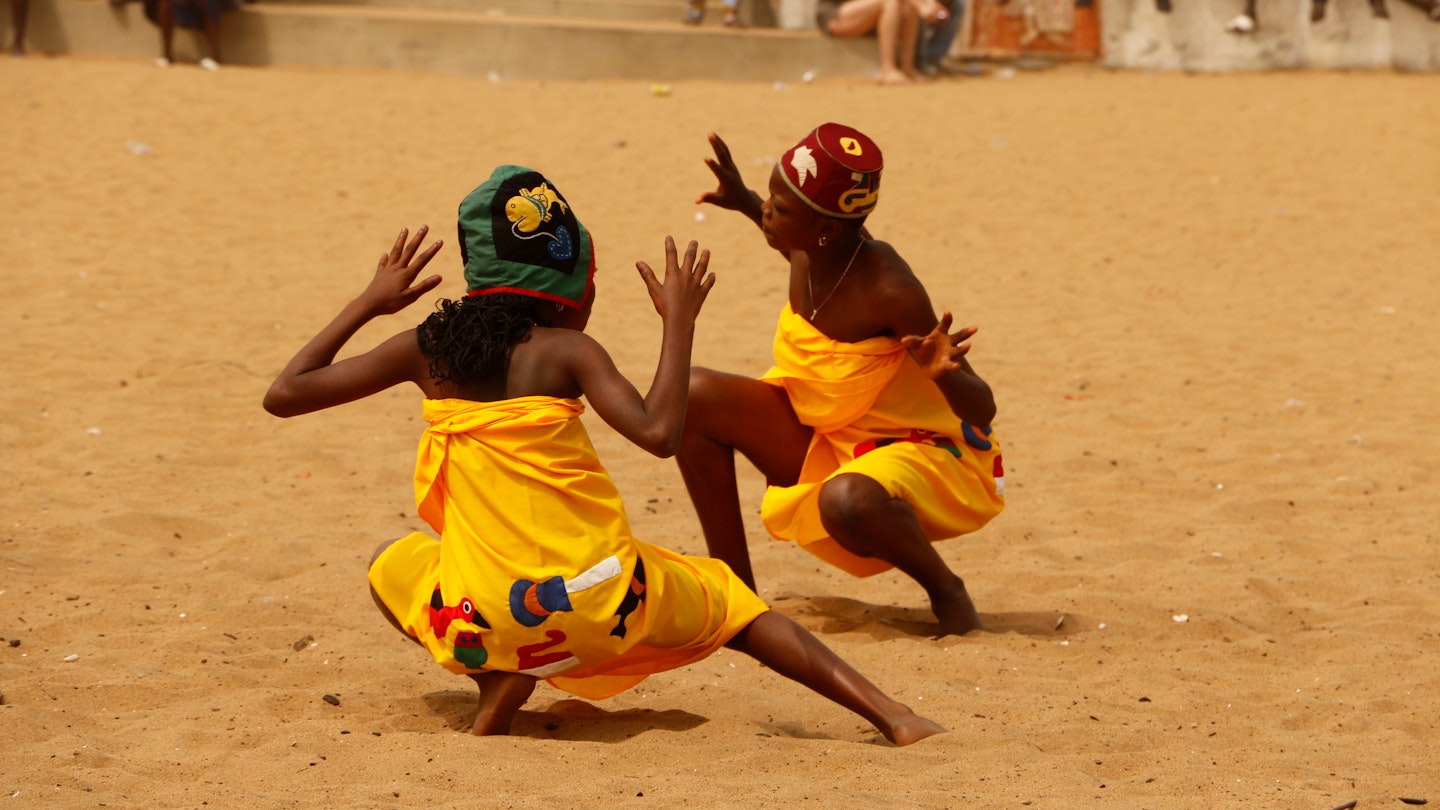
Children dancing on the beach during a Vodou festival in Benin © Cora Unk Photo / Shutterstock
Benin may have fewer visitors than its larger West African neighbors but that's no reflection of what it has to offer travelers.
This unique country has a fascinating history and culture, with fables of ancient kingdoms, beautiful beaches, incredible wildlife and its status as the birthplace of Vodou. Here's everything you need to know before booking your Benin vacation.
1. Apply for a visa early
Unless you are a member of the ECOWAS (Economic Community of West African States), you will most likely need to apply for a visa to travel to Benin. There are different kinds of tourist visas including the 30 days single entry visa, 30 days multiple entry visa and the 90 days multiple entry visa. There are other business visas available too.
If you are traveling to Benin for a short period of time, you should get the 30 days multiple entry visa. Luckily the process is pretty straightforward for most travelers and you can apply online via the Benin e-visa site . The site also has lots of information regarding which countries are covered by the e-visa and the application process. If you need more detailed assistance, you can visit the nearest Benin embassy to your country of residence. For Europe and the UK, the Embassy of Benin is located in Paris, and in the United States, the Embassy of Benin is located in Washington.
To apply for a visa, you'll need the following documents:
- A valid passport for 6 months and if you are also planning to visit Togo, your passport needs to be valid for at least a year
- At least 2 pages free in your passport
- Passport photos
- Yellow fever certificate
- Flight details
- Hotel address (for your first night in Benin)
2. A yellow fever certificate is vital
This is mandatory while traveling in African countries and also in some parts of Asia. All visitors traveling to Benin need a yellow fever certificate and you will be refused entry without one. Proof of this vaccination is also required during your application for a visa. Book it well in advance of your planned trip.
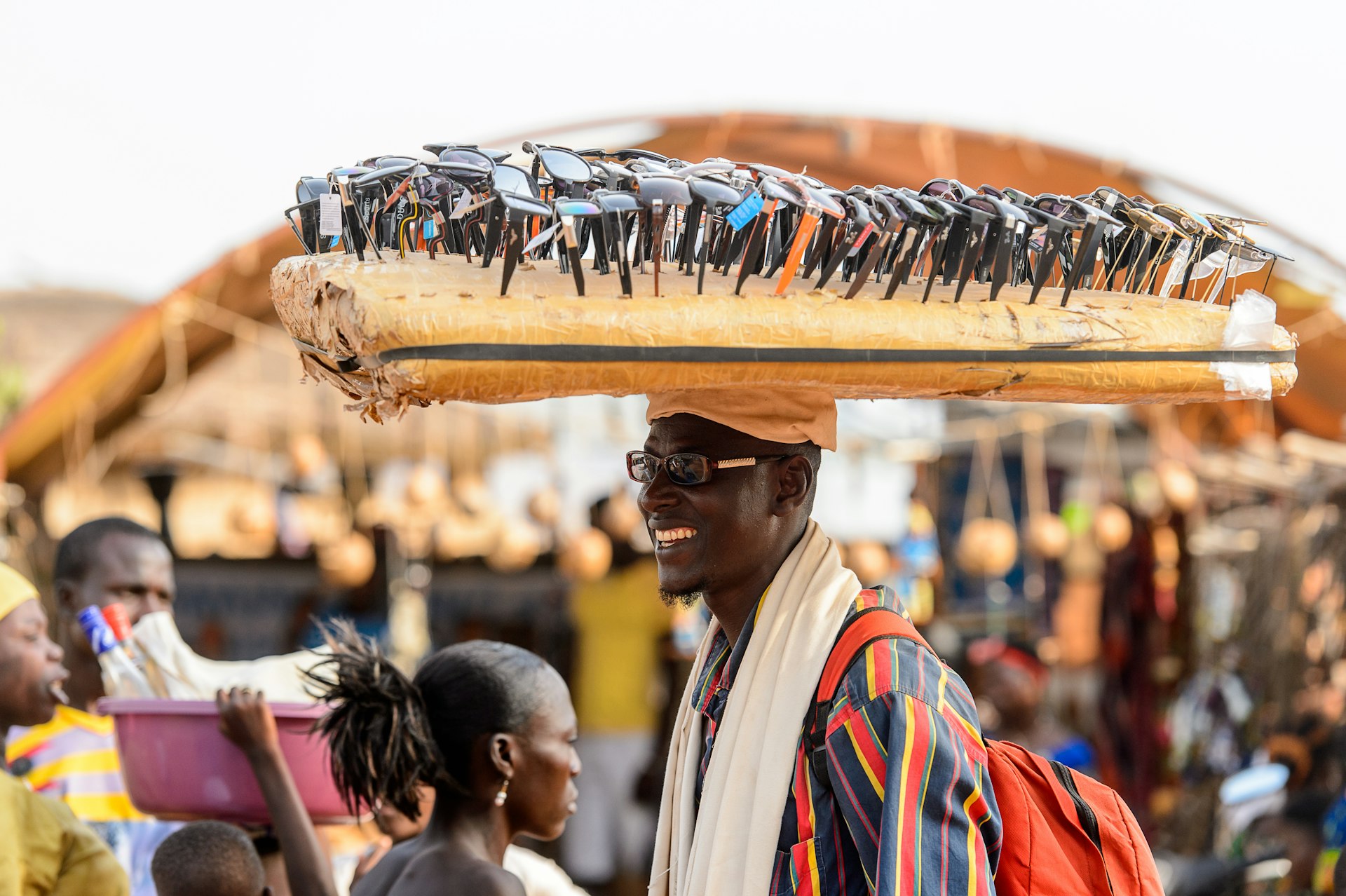
3. Cash is king in Benin
Card services are available in affluent areas in Benin but if you are dealing with local guides and need to move around, you need cash. It's always important to have quite a significant amount of West African CFA francs on you while traveling through Benin. The easiest currency that you can change is Euros – if you don't have Euros, you'll struggle to change other currencies and it's better to just withdraw cash from an ATM. Visa is widely accepted but you'll struggle a little more with a MasterCard.
It's also important to break large notes into smaller denominations for shopping in the markets and visiting villages. You're better able to bargain with market vendors with small bills and they're also handy to have for public transportation.
4. Benin is a French-speaking country
French is the official language of Benin and is spoken by everyone. English...less so. If you can't speak French, you'll struggle to communicate – your best bet is a translation app on your phone or hiring a tour guide that speaks English to help your trip go smoothly.
5. A local sim card is key
When you arrive, get a local sim card that will give you cheap access to calls and mobile data. The best network for travelers is MTN as it operates throughout the African continent and you'll have internet access wherever you are in Benin. You'll need your passport as ID to purchase the sim card and your phone will have to be unlocked.
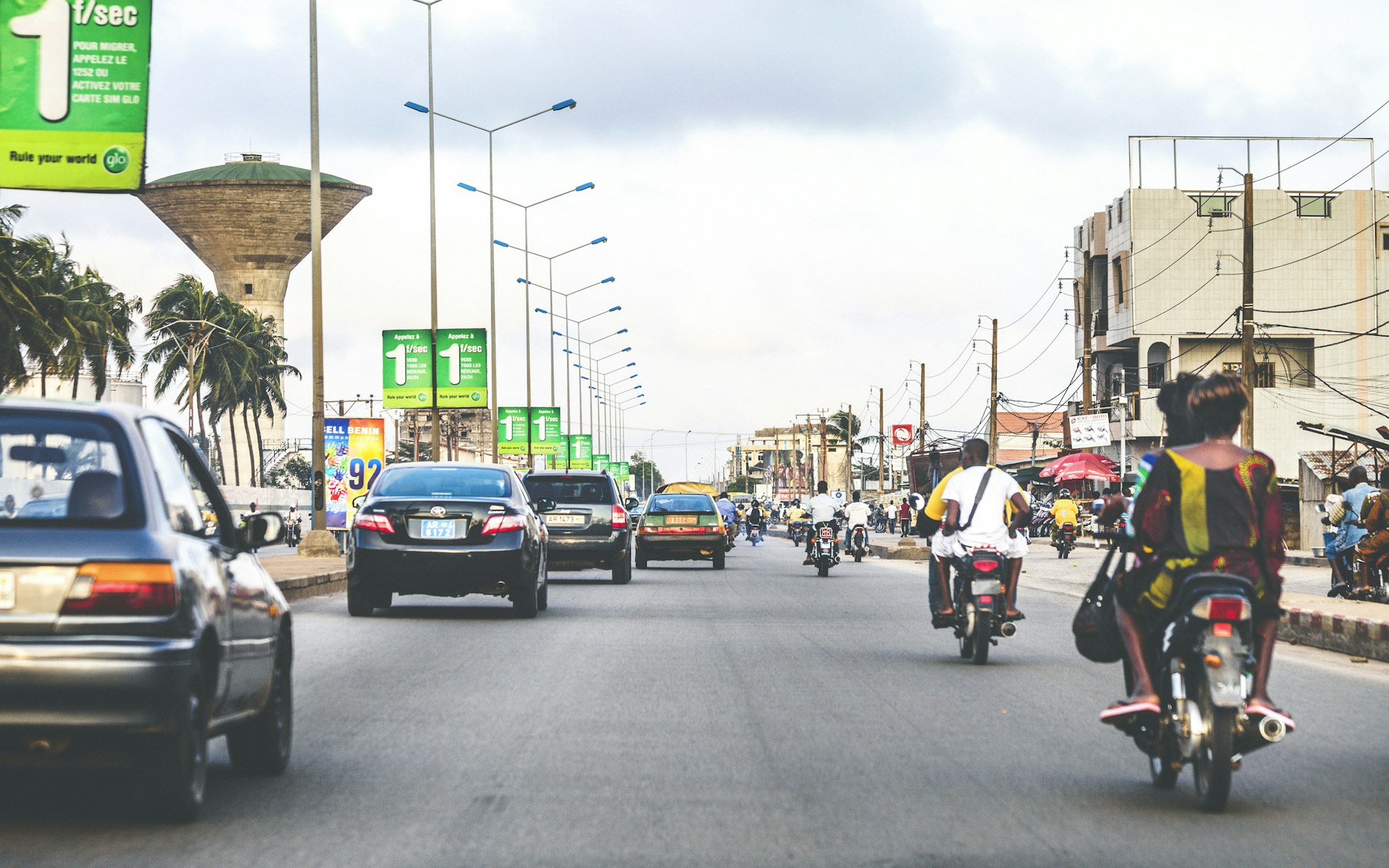
6. A car is the best option for getting around Benin
Benin is best explored by road. You can either rent a car – the more expensive option – or you can use taxis. There are two types of taxis in Benin: bush taxis and normal taxis. Bush taxis are a shared mode of transportation that locals use. Normal taxis are fairly cheap but are unreliable and will likely result in a longer journey time because of that.
As of now, there are no taxi apps in Benin and the prices are quite unreliable. Alternatively, you can take the adventurous local option by using "zems" – motorcycle taxis that are used to travel between cities and towns.
7. Low season is the time to visit
Travel during the low season either from February to April or September to November. Conditions in Benin are at their best from September to November, just before the peak of the dry season. Temperatures aren't yet at their highest and you'll be able to move around more easily.
If you visit from January to May, you'll experience the high season in full force – the intense heat levels at this time can be overwhelming for some travelers.
8. Try the local cuisine
Besides the popular West African dishes such as fufu (maize), jollof rice, plantain, peanut soup and fresh fish, all of which are delightfully appetizing, there are delicacies including wagashi made by the Fulani people. This is a type of cheese that is unique to the region and it's delicious.
When you're exploring a beach area, try the local coconut juice that comes straight from the coconut trees towering above you. There's nothing sweeter and more refreshing than fresh coconut juice while relaxing on the beach.
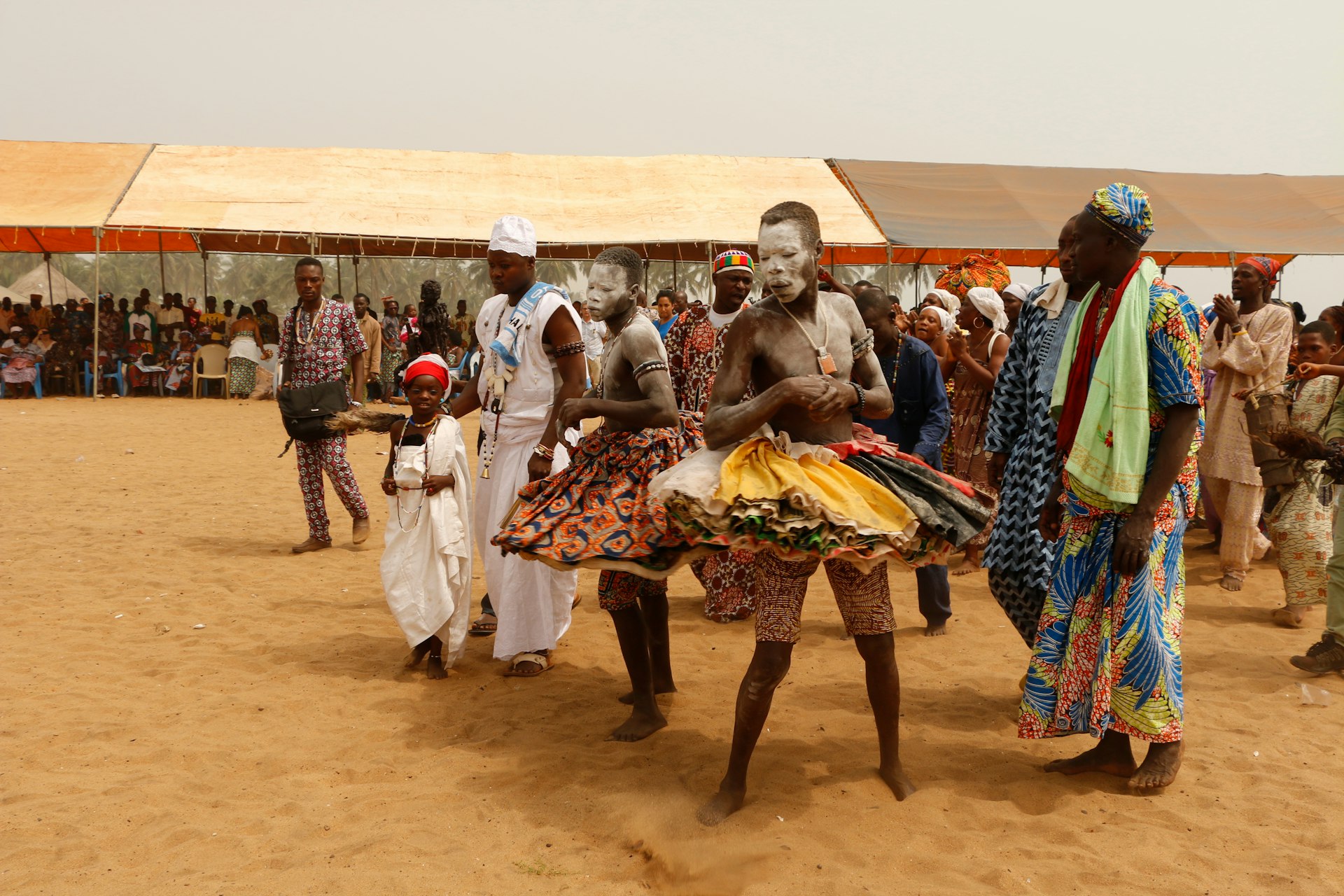
9. Vodou is a way of life
Vodou is one of the oldest religions in the world and is often misinterpreted and misjudged by Western societies. This religion is incredibly complex and very deep. The word “Vodou” means spirit in the local Fon language. There are hundreds of deities and gods, as well as several priests, sorcerers, healers and witches.
While exploring Benin, you are likely to hear a lot about the Zangbetos (night watchmen) and the Egunguns (dead spirits who overtake a human body and directly communicate with the ancestors). You will also get to see Vodou dolls , which are a real part of the religion and used to heal illnesses and stop pain, rather than cause it.
10. Animal sacrifices are often part of Vodou ceremonies
Vodou is primarily animalistic and the practitioners believe that animals, objects and places all have a spiritual significance. Therefore, it's likely you'll see some animal sacrifices while visiting the shrines – this is how the priests make offerings to the gods. Most of the time, these sacrifices are done to bring good fortune to the shrine or ward off bad spirits.
Many of the sacrifices are now highly commercialized and are done at a price for tourists. The animal's throat will be cut and the blood poured onto the shrine as the priest recites a prayer.
Most authentic ceremonies are not planned and you must be invited to attend one. While it is a unique experience, some travelers may find it understandably upsetting to witness if unprepared.
11. Have an open mind
If you have grown up with a Westernized belief system, Vodou may seem like the antithesis of everything you believe in. However, travel is about embracing the beauty of diverse cultures and experiencing foreign ways of life. There will be stories that you hear that do not make sense to you or things you see that seem odd or unusual. Go to Benin with an open mind and prioritize the experience rather than feeling compelled to judge it.
The Beninise are extremely superstitious and you'll see writings on the wall or unusual events occurring at ceremonies – embrace the opportunity to expand your worldview. Be curious and open-minded and you'll have an incredible experience getting to know the real Benin.
Explore related stories
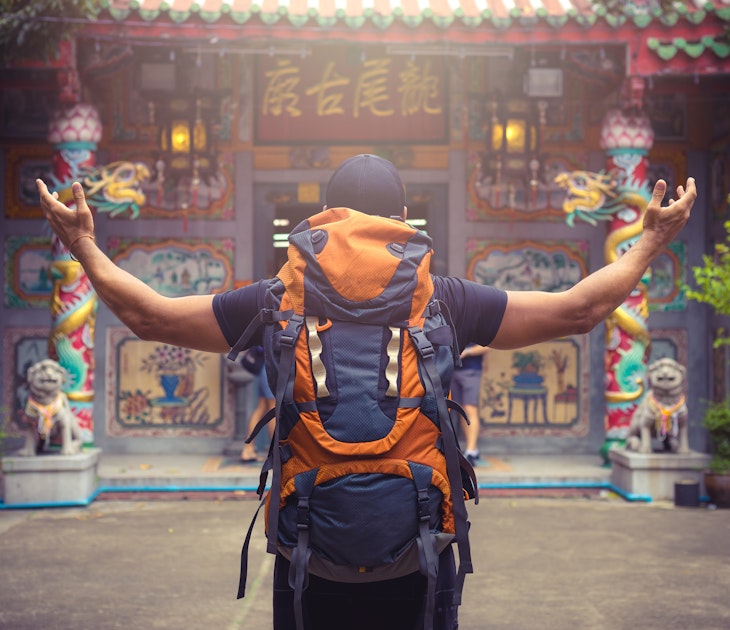
Festivals & Events
Apr 8, 2024 • 6 min read
With three seasons – hot, rainy and (comparatively) cool – Bangkok offers very different experiences throughout the year. Here's the best time to visit.
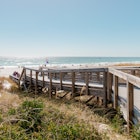
Apr 8, 2024 • 7 min read

Apr 8, 2024 • 13 min read

Apr 7, 2024 • 4 min read

Apr 7, 2024 • 5 min read

Apr 7, 2024 • 11 min read
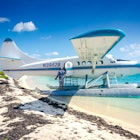
Apr 7, 2024 • 6 min read
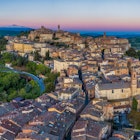
You are using an outdated browser. Upgrade your browser today or install Google Chrome Frame to better experience this site.
Benin Traveler View
Travel health notices, vaccines and medicines, non-vaccine-preventable diseases, stay healthy and safe.
- Packing List
After Your Trip
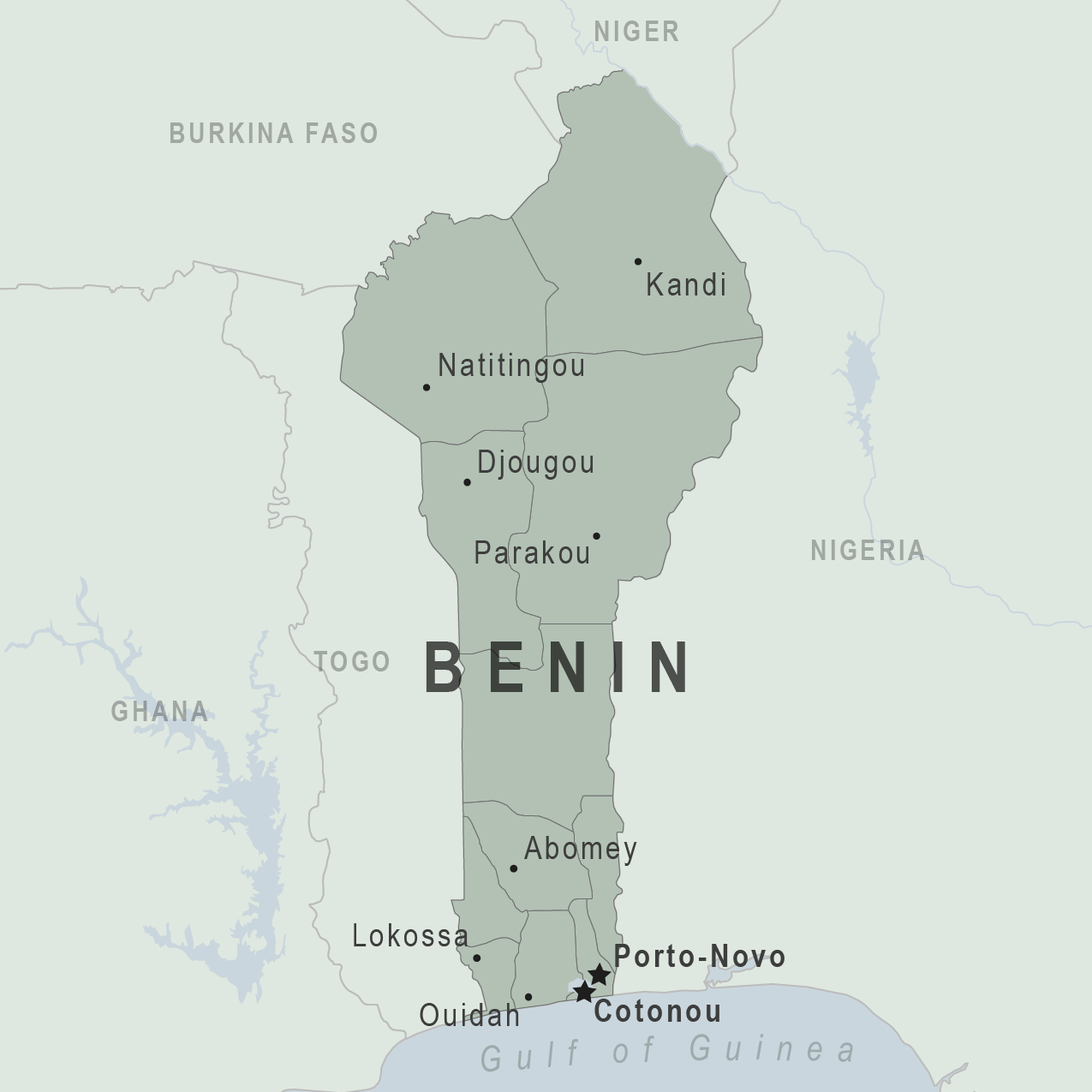
Be aware of current health issues in Benin. Learn how to protect yourself.
Level 2 Practice Enhanced Precautions
- Global Polio January 05, 2024 Some international destinations have circulating poliovirus. Before any international travel, make sure you are up to date on your polio vaccines. Destination List: Afghanistan, Algeria, Benin, Botswana, Burkina Faso, Burundi, Cameroon, Central African Republic, Chad, Côte d'Ivoire (Ivory Coast), Democratic Republic of the Congo, Egypt, Guinea, Indonesia, Israel, including the West Bank and Gaza, Kenya, Madagascar, Malawi, Mali, Mauritania, Mozambique, Niger, Nigeria, Pakistan, Republic of the Congo, Somalia, Sudan, Tanzania, including Zanzibar, Yemen, Zambia, Zimbabwe
Level 1 Practice Usual Precautions
- Global Measles March 22, 2024 Many international destinations are reporting increased numbers of cases of measles. Destination List: Afghanistan, Angola, Armenia, Azerbaijan, Benin, Burkina Faso, Burundi, Cameroon, Central African Republic, Chad, Côte d'Ivoire (Ivory Coast), Democratic Republic of the Congo, Djibouti, Equatorial Guinea, Ethiopia, Gabon, Ghana, India, Indonesia, Kazakhstan, Kyrgyzstan, Lebanon, Liberia, Libya, Malaysia, Mauritania, Nepal, Niger, Nigeria, Pakistan, Qatar, Republic of South Sudan, Republic of the Congo, Romania, Russia, Senegal, Somalia, Sri Lanka, Sudan, Syria, Tajikistan, Togo, Turkey, United Arab Emirates, Uzbekistan, Yemen, Zambia
⇧ Top
Check the vaccines and medicines list and visit your doctor at least a month before your trip to get vaccines or medicines you may need. If you or your doctor need help finding a location that provides certain vaccines or medicines, visit the Find a Clinic page.
Routine vaccines
Recommendations.
Make sure you are up-to-date on all routine vaccines before every trip. Some of these vaccines include
- Chickenpox (Varicella)
- Diphtheria-Tetanus-Pertussis
- Flu (influenza)
- Measles-Mumps-Rubella (MMR)
Immunization schedules
All eligible travelers should be up to date with their COVID-19 vaccines. Please see Your COVID-19 Vaccination for more information.
COVID-19 vaccine
There is no longer active cholera transmission, and vaccine is not recommended.
Cholera - CDC Yellow Book
Hepatitis A
Recommended for unvaccinated travelers one year old or older going to Benin.
Infants 6 to 11 months old should also be vaccinated against Hepatitis A. The dose does not count toward the routine 2-dose series.
Travelers allergic to a vaccine component or who are younger than 6 months should receive a single dose of immune globulin, which provides effective protection for up to 2 months depending on dosage given.
Unvaccinated travelers who are over 40 years old, immunocompromised, or have chronic medical conditions planning to depart to a risk area in less than 2 weeks should get the initial dose of vaccine and at the same appointment receive immune globulin.
Hepatitis A - CDC Yellow Book
Dosing info - Hep A
Hepatitis B
Recommended for unvaccinated travelers of all ages traveling to Benin.
Hepatitis B - CDC Yellow Book
Dosing info - Hep B
CDC recommends that travelers going to Benin take prescription medicine to prevent malaria. Depending on the medicine you take, you will need to start taking this medicine multiple days before your trip, as well as during and after your trip. Talk to your doctor about which malaria medication you should take.
Find country-specific information about malaria.
Malaria - CDC Yellow Book
Considerations when choosing a drug for malaria prophylaxis (CDC Yellow Book)
Malaria information for Benin.
Cases of measles are on the rise worldwide. Travelers are at risk of measles if they have not been fully vaccinated at least two weeks prior to departure, or have not had measles in the past, and travel internationally to areas where measles is spreading.
All international travelers should be fully vaccinated against measles with the measles-mumps-rubella (MMR) vaccine, including an early dose for infants 6–11 months, according to CDC’s measles vaccination recommendations for international travel .
Measles (Rubeola) - CDC Yellow Book
Meningitis (Meningococcal disease)
Recommended for travelers 2 months old or older traveling to areas of Benin that are part of the meningitis belt during the dry season.
Meningococcal disease - CDC Yellow Book
Meningitis Belt Map
In Benin poliovirus has been identified in the past year.
Travelers to Benin are at increased risk of exposure to poliovirus.
Vaccine recommendations : Adults traveling to Benin who received a complete polio vaccination series as children may receive a single lifetime booster dose of inactivated polio vaccine; travelers who are unvaccinated or not fully vaccinated should receive a complete polio vaccination series before travel. Children who are not fully vaccinated will be considered for an accelerated vaccination schedule .
Polio - CDC Yellow Book
Polio: For Travelers
Rabid dogs are commonly found in Benin. If you are bitten or scratched by a dog or other mammal while in Benin, there may be limited or no rabies treatment available.
Consider rabies vaccination before your trip if your activities mean you will be around dogs or wildlife.
Travelers more likely to encounter rabid animals include
- Campers, adventure travelers, or cave explorers (spelunkers)
- Veterinarians, animal handlers, field biologists, or laboratory workers handling animal specimens
- Visitors to rural areas
Since children are more likely to be bitten or scratched by a dog or other animals, consider rabies vaccination for children traveling to Benin.
Rabies - CDC Yellow Book
Recommended for most travelers, especially those staying with friends or relatives or visiting smaller cities or rural areas.
Typhoid - CDC Yellow Book
Dosing info - Typhoid
Yellow Fever
Required for all arriving travelers ≥9 months old
Recommended for all travelers ≥9 months old
Yellow Fever - CDC Yellow Book
- Avoid contaminated water
Leptospirosis
How most people get sick (most common modes of transmission)
- Touching urine or other body fluids from an animal infected with leptospirosis
- Swimming or wading in urine-contaminated fresh water, or contact with urine-contaminated mud
- Drinking water or eating food contaminated with animal urine
- Avoid contaminated water and soil
Clinical Guidance
Schistosomiasis
- Wading, swimming, bathing, or washing in contaminated freshwater streams, rivers, ponds, lakes, or untreated pools.
Avoid bug bites
African tick-bite fever.
- Avoid Bug Bites
African Tick-bite fever
Crimean-Congo Hemorrhagic fever
- Tick bite
- Touching the body fluids of a person or animal infected with CCHF
- Mosquito bite
Airborne & droplet
- Breathing in air or accidentally eating food contaminated with the urine, droppings, or saliva of infected rodents
- Bite from an infected rodent
- Less commonly, being around someone sick with hantavirus (only occurs with Andes virus)
- Avoid rodents and areas where they live
- Avoid sick people
Lassa Fever
- Breathe in air or eat food contaminated with the urine or droppings of infected rats
- Touch the body fluids of a person infected with Lassa virus or objects contaminated with infected body fluids
Lassa fever
Tuberculosis (TB)
- Breathe in TB bacteria that is in the air from an infected and contagious person coughing, speaking, or singing.
Learn actions you can take to stay healthy and safe on your trip. Vaccines cannot protect you from many diseases in Benin, so your behaviors are important.
Eat and drink safely
Food and water standards around the world vary based on the destination. Standards may also differ within a country and risk may change depending on activity type (e.g., hiking versus business trip). You can learn more about safe food and drink choices when traveling by accessing the resources below.
- Choose Safe Food and Drinks When Traveling
- Water Treatment Options When Hiking, Camping or Traveling
- Global Water, Sanitation and Hygiene | Healthy Water
- Avoid Contaminated Water During Travel
You can also visit the Department of State Country Information Pages for additional information about food and water safety.
Prevent bug bites
Bugs (like mosquitoes, ticks, and fleas) can spread a number of diseases in Benin. Many of these diseases cannot be prevented with a vaccine or medicine. You can reduce your risk by taking steps to prevent bug bites.
What can I do to prevent bug bites?
- Cover exposed skin by wearing long-sleeved shirts, long pants, and hats.
- Use an appropriate insect repellent (see below).
- Use permethrin-treated clothing and gear (such as boots, pants, socks, and tents). Do not use permethrin directly on skin.
- Stay and sleep in air-conditioned or screened rooms.
- Use a bed net if the area where you are sleeping is exposed to the outdoors.
What type of insect repellent should I use?
- FOR PROTECTION AGAINST TICKS AND MOSQUITOES: Use a repellent that contains 20% or more DEET for protection that lasts up to several hours.
- Picaridin (also known as KBR 3023, Bayrepel, and icaridin)
- Oil of lemon eucalyptus (OLE) or para-menthane-diol (PMD)
- 2-undecanone
- Always use insect repellent as directed.
What should I do if I am bitten by bugs?
- Avoid scratching bug bites, and apply hydrocortisone cream or calamine lotion to reduce the itching.
- Check your entire body for ticks after outdoor activity. Be sure to remove ticks properly.
What can I do to avoid bed bugs?
Although bed bugs do not carry disease, they are an annoyance. See our information page about avoiding bug bites for some easy tips to avoid them. For more information on bed bugs, see Bed Bugs .
For more detailed information on avoiding bug bites, see Avoid Bug Bites .
Stay safe outdoors
If your travel plans in Benin include outdoor activities, take these steps to stay safe and healthy during your trip.
- Stay alert to changing weather conditions and adjust your plans if conditions become unsafe.
- Prepare for activities by wearing the right clothes and packing protective items, such as bug spray, sunscreen, and a basic first aid kit.
- Consider learning basic first aid and CPR before travel. Bring a travel health kit with items appropriate for your activities.
- If you are outside for many hours in heat, eat salty snacks and drink water to stay hydrated and replace salt lost through sweating.
- Protect yourself from UV radiation : use sunscreen with an SPF of at least 15, wear protective clothing, and seek shade during the hottest time of day (10 a.m.–4 p.m.).
- Be especially careful during summer months and at high elevation. Because sunlight reflects off snow, sand, and water, sun exposure may be increased during activities like skiing, swimming, and sailing.
- Very cold temperatures can be dangerous. Dress in layers and cover heads, hands, and feet properly if you are visiting a cold location.
Stay safe around water
- Swim only in designated swimming areas. Obey lifeguards and warning flags on beaches.
- Practice safe boating—follow all boating safety laws, do not drink alcohol if driving a boat, and always wear a life jacket.
- Do not dive into shallow water.
- Do not swim in freshwater in developing areas or where sanitation is poor.
- Avoid swallowing water when swimming. Untreated water can carry germs that make you sick.
- To prevent infections, wear shoes on beaches where there may be animal waste.
Schistosomiasis, a parasitic infection that can be spread in fresh water, is found in Benin. Avoid swimming in fresh, unchlorinated water, such as lakes, ponds, or rivers.
Keep away from animals
Most animals avoid people, but they may attack if they feel threatened, are protecting their young or territory, or if they are injured or ill. Animal bites and scratches can lead to serious diseases such as rabies.
Follow these tips to protect yourself:
- Do not touch or feed any animals you do not know.
- Do not allow animals to lick open wounds, and do not get animal saliva in your eyes or mouth.
- Avoid rodents and their urine and feces.
- Traveling pets should be supervised closely and not allowed to come in contact with local animals.
- If you wake in a room with a bat, seek medical care immediately. Bat bites may be hard to see.
All animals can pose a threat, but be extra careful around dogs, bats, monkeys, sea animals such as jellyfish, and snakes. If you are bitten or scratched by an animal, immediately:
- Wash the wound with soap and clean water.
- Go to a doctor right away.
- Tell your doctor about your injury when you get back to the United States.
Consider buying medical evacuation insurance. Rabies is a deadly disease that must be treated quickly, and treatment may not be available in some countries.
Reduce your exposure to germs
Follow these tips to avoid getting sick or spreading illness to others while traveling:
- Wash your hands often, especially before eating.
- If soap and water aren’t available, clean hands with hand sanitizer (containing at least 60% alcohol).
- Don’t touch your eyes, nose, or mouth. If you need to touch your face, make sure your hands are clean.
- Cover your mouth and nose with a tissue or your sleeve (not your hands) when coughing or sneezing.
- Try to avoid contact with people who are sick.
- If you are sick, stay home or in your hotel room, unless you need medical care.
Avoid sharing body fluids
Diseases can be spread through body fluids, such as saliva, blood, vomit, and semen.
Protect yourself:
- Use latex condoms correctly.
- Do not inject drugs.
- Limit alcohol consumption. People take more risks when intoxicated.
- Do not share needles or any devices that can break the skin. That includes needles for tattoos, piercings, and acupuncture.
- If you receive medical or dental care, make sure the equipment is disinfected or sanitized.
Know how to get medical care while traveling
Plan for how you will get health care during your trip, should the need arise:
- Carry a list of local doctors and hospitals at your destination.
- Review your health insurance plan to determine what medical services it would cover during your trip. Consider purchasing travel health and medical evacuation insurance.
- Carry a card that identifies, in the local language, your blood type, chronic conditions or serious allergies, and the generic names of any medications you take.
- Some prescription drugs may be illegal in other countries. Call Benin’s embassy to verify that all of your prescription(s) are legal to bring with you.
- Bring all the medicines (including over-the-counter medicines) you think you might need during your trip, including extra in case of travel delays. Ask your doctor to help you get prescriptions filled early if you need to.
Many foreign hospitals and clinics are accredited by the Joint Commission International. A list of accredited facilities is available at their website ( www.jointcommissioninternational.org ).
In some countries, medicine (prescription and over-the-counter) may be substandard or counterfeit. Bring the medicines you will need from the United States to avoid having to buy them at your destination.
Malaria is a risk in Benin. Fill your malaria prescription before you leave and take enough with you for the entire length of your trip. Follow your doctor’s instructions for taking the pills; some need to be started before you leave.
Select safe transportation
Motor vehicle crashes are the #1 killer of healthy US citizens in foreign countries.
In many places cars, buses, large trucks, rickshaws, bikes, people on foot, and even animals share the same lanes of traffic, increasing the risk for crashes.
Be smart when you are traveling on foot.
- Use sidewalks and marked crosswalks.
- Pay attention to the traffic around you, especially in crowded areas.
- Remember, people on foot do not always have the right of way in other countries.
Riding/Driving
Choose a safe vehicle.
- Choose official taxis or public transportation, such as trains and buses.
- Ride only in cars that have seatbelts.
- Avoid overcrowded, overloaded, top-heavy buses and minivans.
- Avoid riding on motorcycles or motorbikes, especially motorbike taxis. (Many crashes are caused by inexperienced motorbike drivers.)
- Choose newer vehicles—they may have more safety features, such as airbags, and be more reliable.
- Choose larger vehicles, which may provide more protection in crashes.
Think about the driver.
- Do not drive after drinking alcohol or ride with someone who has been drinking.
- Consider hiring a licensed, trained driver familiar with the area.
- Arrange payment before departing.
Follow basic safety tips.
- Wear a seatbelt at all times.
- Sit in the back seat of cars and taxis.
- When on motorbikes or bicycles, always wear a helmet. (Bring a helmet from home, if needed.)
- Avoid driving at night; street lighting in certain parts of Benin may be poor.
- Do not use a cell phone or text while driving (illegal in many countries).
- Travel during daylight hours only, especially in rural areas.
- If you choose to drive a vehicle in Benin, learn the local traffic laws and have the proper paperwork.
- Get any driving permits and insurance you may need. Get an International Driving Permit (IDP). Carry the IDP and a US-issued driver's license at all times.
- Check with your auto insurance policy's international coverage, and get more coverage if needed. Make sure you have liability insurance.
- Avoid using local, unscheduled aircraft.
- If possible, fly on larger planes (more than 30 seats); larger airplanes are more likely to have regular safety inspections.
- Try to schedule flights during daylight hours and in good weather.
Medical Evacuation Insurance
If you are seriously injured, emergency care may not be available or may not meet US standards. Trauma care centers are uncommon outside urban areas. Having medical evacuation insurance can be helpful for these reasons.
Helpful Resources
Road Safety Overseas (Information from the US Department of State): Includes tips on driving in other countries, International Driving Permits, auto insurance, and other resources.
The Association for International Road Travel has country-specific Road Travel Reports available for most countries for a minimal fee.
Maintain personal security
Use the same common sense traveling overseas that you would at home, and always stay alert and aware of your surroundings.
Before you leave
- Research your destination(s), including local laws, customs, and culture.
- Monitor travel advisories and alerts and read travel tips from the US Department of State.
- Enroll in the Smart Traveler Enrollment Program (STEP) .
- Leave a copy of your itinerary, contact information, credit cards, and passport with someone at home.
- Pack as light as possible, and leave at home any item you could not replace.
While at your destination(s)
- Carry contact information for the nearest US embassy or consulate .
- Carry a photocopy of your passport and entry stamp; leave the actual passport securely in your hotel.
- Follow all local laws and social customs.
- Do not wear expensive clothing or jewelry.
- Always keep hotel doors locked, and store valuables in secure areas.
- If possible, choose hotel rooms between the 2nd and 6th floors.
Healthy Travel Packing List
Use the Healthy Travel Packing List for Benin for a list of health-related items to consider packing for your trip. Talk to your doctor about which items are most important for you.
Why does CDC recommend packing these health-related items?
It’s best to be prepared to prevent and treat common illnesses and injuries. Some supplies and medicines may be difficult to find at your destination, may have different names, or may have different ingredients than what you normally use.
If you are not feeling well after your trip, you may need to see a doctor. If you need help finding a travel medicine specialist, see Find a Clinic . Be sure to tell your doctor about your travel, including where you went and what you did on your trip. Also tell your doctor if you were bitten or scratched by an animal while traveling.
If your doctor prescribed antimalarial medicine for your trip, keep taking the rest of your pills after you return home. If you stop taking your medicine too soon, you could still get sick.
Malaria is always a serious disease and may be a deadly illness. If you become ill with a fever either while traveling in a malaria-risk area or after you return home (for up to 1 year), you should seek immediate medical attention and should tell the doctor about your travel history.
For more information on what to do if you are sick after your trip, see Getting Sick after Travel .
Map Disclaimer - The boundaries and names shown and the designations used on maps do not imply the expression of any opinion whatsoever on the part of the Centers for Disease Control and Prevention concerning the legal status of any country, territory, city or area or of its authorities, or concerning the delimitation of its frontiers or boundaries. Approximate border lines for which there may not yet be full agreement are generally marked.
Other Destinations
If you need help finding travel information:
Message & data rates may apply. CDC Privacy Policy
File Formats Help:
- Adobe PDF file
- Microsoft PowerPoint file
- Microsoft Word file
- Microsoft Excel file
- Audio/Video file
- Apple Quicktime file
- RealPlayer file
- Zip Archive file

Exit Notification / Disclaimer Policy
- The Centers for Disease Control and Prevention (CDC) cannot attest to the accuracy of a non-federal website.
- Linking to a non-federal website does not constitute an endorsement by CDC or any of its employees of the sponsors or the information and products presented on the website.
- You will be subject to the destination website's privacy policy when you follow the link.
- CDC is not responsible for Section 508 compliance (accessibility) on other federal or private website.
- Information

Travelling from Nigeria to Cotonou (Benin Republic). The road map to Benin Republic guide for students, businessmen and visitors
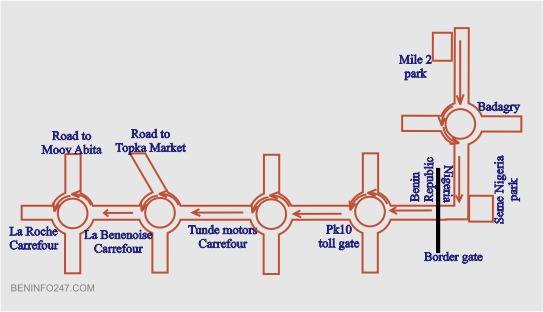
guide road map from lagos to cotonou
Table of Contents
Travelling from Nigeria to Cotonou (Benin Republic). The road map to Benin Republic.
Over the months, we here in Beninfo247.com from our education and consultation department got lot of questions on directions to get to Benin republic. Such questions were as follows
- How do I find my way to Cotonou from Jos, Kaunda, Kano, Enugu, Benin, Port Harcourt e.t.c .
- How much is the transportation fare from stated locations to Benin republic.
- Others ask about the time duration from their locations to Cotonou, Benin republic.
- Which car or transportation root will i follow to travel to Cotonou, Benin Republic.
- I got admission to study in Benin Republic but i do not know how to find my way to the school.
I got these questions and realized the need for a clear road map and tips on things you should do as you embark on the journey to Cotonou, Benin republic.
The breakdown
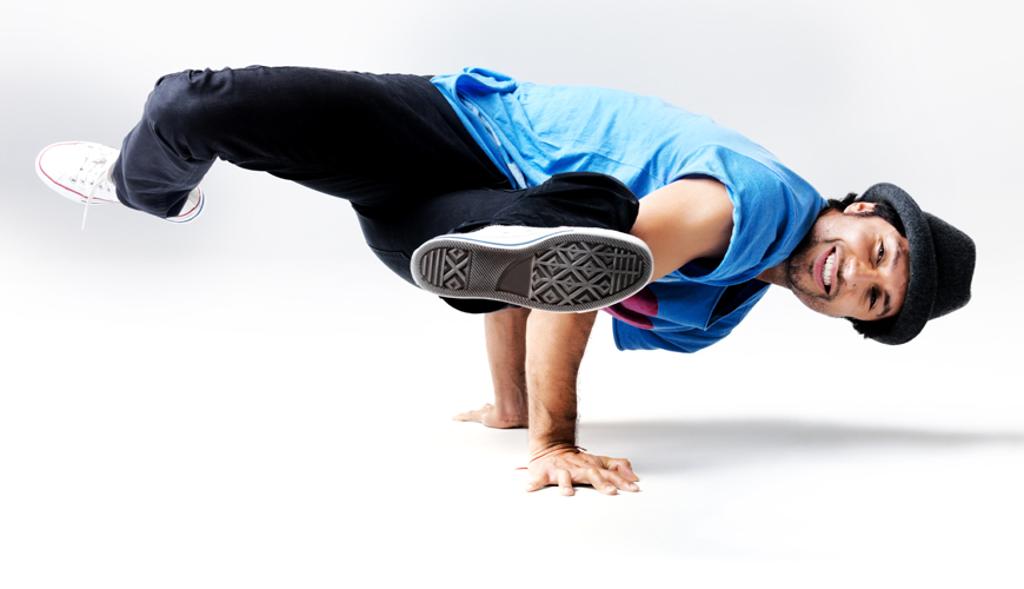
road map breakdown
From wherever location you tend to find yourself, be it the north, east, west or south, all you need to do is travel from your location to Lagos. Instruct the driver to drop you at mile 2.
(From mile 2 to seme border) as soon as you arrive at mile 2, locate an array of cars and buses calling for passengers to seme by the right side of the road. If this task seem hard, you should get help. Charges from mile 2 to seme border by car is usually within the price range of 1000-1500 naira. Never forget to remain cautious while you ensure safety of your luggage throughout the journey.
crossing the border into Benin republic. On your arrival, note that your car or bus will stop at conoil fililng station or a park at the left hand side of the road at seme border. Once you alight from the vehicle, Get a bike usually charged at 500 naira and cross into Benin republic. The bike rider should drop you at the park where you will join a car heading to Cotonou. Note that your money should be changed from naira to CFA., at this point, you need to act smart. You should ask for the exchange rate before the exchange takes place, you can call Beninfo247 representative to help you with the current exchange rate.
After changing your naira to CFA, inform the new driver of your destination. I assume you should have the knowledge of where you are to alight from your instructor or receptionist in Cotonou e.g tokpa, tunde motors, pekadis e.t.c. I advise that some one await your arrival at your destination. If you do not have a confidant and you are coming to school for the first time, you can contact benininfo247.com which is certainly your best option since your safety is a priority with beninifo 247.
Your transport fare from Lagos to Cotonou should not be above 4,000 naira. Ensure you watch your luggage as you travel along and make sure you have someone you can rely on before entering Cotonou, Benin Republic.
I hope this little piece helps you arrive at Cotonou without stress. If you find this helpful and useful please share and also if you were able to make here either through this guide or not please comment bellow about your experience.
You may also like

How to Identify the Best Customer for Your Business In...

Generational Wealth Secrets: How Did the Rich Build...

How to Craft an Effective Marketing Message in 2024

The 11 Most Effective Marketing Trends You Need to...

TOP 5 BEST UNIVERSITIES IN BENIN REPUBLIC IN 2024

Top Tourist Sites To Visit In Benin Republic
About the author.
@Beninfo24/7
www.beninfo247.com Is a Benin Republic information portal dedicated to providing relevant information to all to Africa and the world about the coastal city of republic of Benin. www.beninfo247.com also know as Benin Info publish information on all aspects of Benin Republic such as politics, sports, education, lifestyle, places,travel business, carrier opportunities, entertainment, people and culture etc.
12 Comments
This blog about Travelling from Nigeria to Cotonou (Benin Republic). The road map. has helped me enormously, is a very good topic.
How i just make money from my home overnight, see here: https://s96.me/overnight-millionaire (or click on the name). Kiss you All!
thanks for the feedback beninfo247.com always here for you.
i am looking for a driving service company to pick me up at Lagos airport and drop me in Cotonou. Can you help?
contact us on whatsapp: +229 67249558 or call: +229 67249558, +229 95337737 for full information
Nice Details Thanks Much
You welcome, we appreciate
Hello, Thanks for the helpful information you’ve presented, I will be visiting Benin Republic very soon and your info is pretty helpful. I have an important online program to pay for and join as soon as possible but Nigerians are not accepted, so i would humbly appreciate if you could help me with how or where to get the Benin Republic ID or any necessary documents required to open a bank account in Benin and acquire my Mastercard or Visacard for online payments.
Hello obieze, please contact us on whatsapp: +229 67249558 or call: +229 67249558 , +229 95337737 for full information.
How much is flight from abuja, Nigeria to contonou
Hello Uzzi. You might want to consider taking a flight from Abuja to Lagos first; then proceed from Lagos to Cotonou. Feel free to call or contact us on WhatsApp +229 67 24 95 58 for more details on that. You could also send an Email to [email protected]
Nice one I love this
thank very much. call/whatsapp +22998130984 for more information and admission processing.
Leave a Comment X
You must be logged in to post a comment.

Situation in Haiti April 5, 2024
U.s. citizens in haiti, update january 10, 2024, information for u.s. citizens in the middle east.
- Travel Advisories |
- Contact Us |
- MyTravelGov |
Find U.S. Embassies & Consulates
Travel.state.gov, congressional liaison, special issuance agency, u.s. passports, international travel, intercountry adoption, international parental child abduction, records and authentications, popular links, travel advisories, mytravelgov, stay connected, legal resources, legal information, info for u.s. law enforcement, replace or certify documents.
Share this page:
Benin Travel Advisory
Travel advisory july 31, 2023, benin - level 2: exercise increased caution.
Reissued with obsolete COVID-19 page links removed.
Exercise increased caution in Benin due to crime, kidnapping, terrorism, and maritime crime. Some areas have increased risk. Read the entire Travel Advisory.
Do Not Travel to:
The northern regions of Benin, including:
- The cities of Kandi and Tanguieta
- North from Kandi and Tanguieta to the Niger / Burkina Faso border
- Pendjari and W National Parks, Zones Cynegetique De La Pendjari, De Latakora, and De Djona, and the adjacent hunting zones
- RNIE 7 between Banikora and Segbana
- RN10 between Nikki and Segbana
Violent crime, such as armed robbery and assault, is common in Benin. There is a risk of maritime crime, including violent attacks and kidnapping at sea, in the Gulf of Guinea.
Terrorists continue plotting attacks in Benin. Terrorists may attack with little or no warning, and could target shop, markets, hotels, places of worship, restaurants, bars, schools, government installations, transportation hubs, and other places where crowds gather.
Read the country information page for additional information on travel to Benin.
If you decide to travel to Benin:
- Do not physically resist any robbery attempt.
- Use caution when walking or driving at night.
- Keep a low profile.
- Enroll in the Smart Traveler Enrollment Program (STEP) to receive Alerts and make it easier to locate you in an emergency.
- Follow the Department of State on Facebook and Twitter .
- Review the Country Security Report for Benin.
- Obtain comprehensive travel medical insurance that includes medical evacuation prior to travel.
- Prepare a contingency plan for emergency situations. Review the Traveler’s Checklist .
- Visit the CDC page for the latest Travel Health Information related to your travel.
Northern Benin – Level 4: Do Not Travel
Extremist groups have carried out attacks in areas of southern Burkina Faso, southern Niger and northern Benin (including near Park Pendjari, Park W, and adjacent hunting zones). Attacks may occur with little or no warning. Western tourists have been kidnapped in Park Pendjari, in northern Benin.
Extremist groups have also operated in the vicinity of Kandi and Tanguieta and in the northeastern border region between Benin and Nigeria, specifically in the border region north of Nikki. Attacks may occur with little or no warning. Foreign nationals and residents are at risk of kidnapping in this region.
The U.S. government has limited ability to provide emergency services to U.S. citizens in Benin’s northern border areas. U.S. government employees are prohibited from personal travel and must obtain special authorization for official travel to the regions described above.
Visit our website for Travel to High-Risk Areas .
Travel Advisory Levels
Assistance for u.s. citizens, search for travel advisories, external link.
You are about to leave travel.state.gov for an external website that is not maintained by the U.S. Department of State.
Links to external websites are provided as a convenience and should not be construed as an endorsement by the U.S. Department of State of the views or products contained therein. If you wish to remain on travel.state.gov, click the "cancel" message.
You are about to visit:
© Copyright AnTvT . All Rights Reserved.
Exploring the Globe with a Nigerian Passport: Top 10 Tourist Destinations You Shouldn’t Miss
Most expensive hotels in nigeria and their price range, 15 most mysterious places in the world, discovering mecca: the comprehensive guide to your stay and the array of spiritual activities in islam’s holiest city, comprehensive guide on how to get a nigerian passport online.

Benin Republic Routes Via Lagos; Road, Air, and, Sea
- Share on Facebook
- Share on Twitter
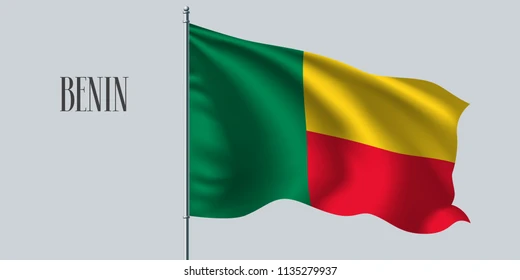
Benin Republic is a small country in West Africa that shares borders with Nigeria to the east and Burkina Faso and Niger to the north. Lagos is the largest city in Nigeria and is a major transportation hub for the region, making it a popular entry point for those traveling to Benin Republic. There are several routes you can take to get to Benin Republic from Lagos, depending on your preferences and travel plans.
By Air : The quickest and most comfortable way to travel from Lagos to Benin Republic is by air. There are several airlines that offer flights between Lagos and Cotonou, the largest city in Benin Republic. The major airlines that fly this route include Air Peace, Arik Air, and Asky Airlines. The flight time is usually less than an hour, and fares start from NGN 40,000, depending on the airline and the time of booking. However, traveling by air can be more expensive than traveling by road, and you may need to factor in transportation to and from the airport.
By Road : If you prefer to travel by road, there are two options available – taking a bus or hiring a private car. The most common and affordable way to travel from Lagos to Benin Republic is by road. You can take a direct bus from Lagos to Cotonou, the largest city and commercial capital of Benin Republic. The journey takes about 4-5 hours, depending on traffic and border formalities. Several private bus companies operate between the two cities, including ABC Transport, Chisco Transport, and God is Good Motors. Fares range from NGN 2,500 to NGN 5,000, depending on the bus company and the class of travel.
Alternatively, you can hire a private car, which will give you more flexibility and comfort, but will be more expensive. A private car can be arranged through a travel agency or by negotiating with a local driver.
By Sea : Another option to consider is traveling by sea. This may be a more adventurous option, and it takes longer than flying or driving. There are ferries that operate between Lagos and Cotonou, and the journey takes around 24 hours. The cost of a ferry ticket is about $50, and you can book through a travel agency or directly with the ferry company.
Combination: You can also combine any of the above modes of transportation to create a custom route that suits your needs. For example, you can fly from Lagos to a city in Benin Republic, and then take a bus or private car to your final destination. Alternatively, you can take a ferry from Lagos to a coastal town in Benin Republic, and then hire a private car to complete the journey.
How To Prepare For Your Trip To Benin Republic
Research the Entry Requirements : While a passport is the most commonly recognized form of identification, it is possible that there are other acceptable forms of identification for entry into Benin. Contact the embassy or consulate of Benin to determine if there are any alternatives.
Obtain the Required Documents : Once you have determined the acceptable forms of identification, ensure that you have all the necessary documents. This may include a visa, travel authorization, or other forms of documentation.
Plan Your Route : There are several routes you can take from Lagos to Benin Republic. Some popular routes include traveling by road, by air, or by sea. You should consider the distance, cost, and time required for each option before making a decision.
Book Your Travel : Once you have determined the best route for your travel, book your transportation. If traveling by road, consider using a reputable bus company. If traveling by air, book your flight through a reputable airline. If traveling by sea, book your passage on a reputable ferry or boat service.
Prepare for Your Trip : Before embarking on your trip, ensure that you have packed all the necessary items for your journey. This includes your identification, money, travel documents, and any other necessary items. You should also inform someone of your travel plans and make arrangements for someone to be able to contact you in case of an emergency.
Navigate Border Control : When crossing the border, be sure to follow all instructions from border control officials. Be respectful and answer any questions truthfully. If you are not able to provide a passport, be sure to have all other necessary documentation on hand.
Ugandan Food : Top 20 Delicacies to Try Out
8 visa-free countries: unlocking travel opportunities for africans.
Leave a reply Cancel reply
Fatal Accident: Pwani University Bus Collides with Matatu in Naivasha, Leaving 14 Dead

Namibian Supreme Court Ruling Recognizes Foreign Same-Sex Marriages, Upholds Equality and Dignity

Revolutionizing Business Growth Strategies: The Transformative Impact of KYC Automation
Latest posts.

7 Lucrative Ways to Earn in Dollars While Living in Nigeria

Discovering Mecca: The Comprehensive Guide to Your Stay and the Array of Spiritual Activities in ...
Weekly podcast, antvt advert.

Africa’s Source for Breaking News | Entertainments | Health | Finance | Sports | Lifestyle and Business News.
Travel News
Personal development.

Emotionally Focused Therapy Deep-dive

2024 Glow-Up Guide: Simple Tips for a Stylish and Confident You
- Skip to main content
- Skip to "About this site"
Language selection
Search travel.gc.ca.
Help us to improve our website. Take our survey !
COVID-19: travel health notice for all travellers
Benin travel advice
Latest updates: The Health section was updated - travel health information (Public Health Agency of Canada)
Last updated: March 13, 2024 14:24 ET
On this page
Safety and security, entry and exit requirements, laws and culture, natural disasters and climate, benin - exercise a high degree of caution.
Exercise a high degree of caution in Benin due to crime.
North of National Highway 7 - Avoid non-essential travel
Avoid non-essential travel to the area north of National Highway 7, due to the threat of terrorism, banditry and the risk of kidnapping.
Border areas with Burkina Faso, Niger and Nigeria - Avoid all travel
Avoid all travel to within 50 km of the borders with Burkina Faso, Niger and Nigeria in the departments of Atacora, Alibori and Borgou due to the threat of terrorism, banditry and the risk of kidnapping. This warning includes the W National Park and the Pendjari National Park.
Back to top
Border areas with Burkina Faso, Niger and Nigeria
Armed groups operate along the borders with Burkina Faso, Niger and Nigeria, including in national parks, in the departments of Atacora, Alibori and Borgou, as well as the area north of National Highway 7. Attacks and kidnappings occur in these areas.
There is also a risk of incursion by Nigerian militants into the Nigerian border regions in the Collines, Plateau and Ouémé departments.
Petty crime
Petty crimes, such as purse snatching and pickpocketing, occur.
Theft is frequent in Cotonou:
- near the port and railroads
- in popular tourist areas, including beaches and the Dantokpa market
- near hotels frequented by foreign tourists
During your trip to Benin:
- ensure that your personal belongings, including your passport and your other travel documents, are secure at all times
- avoid showing signs of affluence or wearing expensive jewellery
- avoid carrying large sums of cash
- be aware of your surroundings, especially in busy tourist areas
- stay in accommodations with adequate security measures
Violent crime
Violent crime occurs occasionally. Incidents include:
- armed robberies, particularly at night in Cotonou and the Nigerian border region
- car and motorcycle hijackings
- sexual assaults
Tourists are usually not targeted, however you could be at the wrong place at the wrong time.
During your stay :
- be aware of your surroundings at all times
- avoid going out and driving after dark
- keep doors locked and windows closed at all times
- if attacked, don’t resist
There is a threat of terrorism. Attacks may occur at any time.
Targets could include:
- government buildings, including schools
- places of worship
- airports and other transportation hubs and networks
- public areas such as tourist attractions, restaurants, bars, coffee shops, shopping centres, markets, hotels and other sites frequented by foreigners
Always be aware of your surroundings when in public places.
Be particularly vigilant during:
- sporting events
- religious holidays
- public celebrations
- major political events, such as elections
Terrorists may use such occasions to mount attacks.
Road safety
Many fatal accidents occur due to poorly maintained vehicles and roads, and failure to observe speed limits. Helmets should be worn when riding motorcycles, as emergency services have variable response times.
Road conditions
Road conditions vary considerably throughout the country. Roads are paved and in fairly good condition in Cotonou, along the coast and as far north as Niger. Elsewhere, most secondary roads are unpaved and can become impassable during the rainy season. Drivers may change lanes without warning because of broken-down vehicles and potholes.
Driving can also be dangerous due to:
- insufficient lighting
- vehicles not using their headlights at night
- lack of guardrail
- lack of traffic signs
- the presence of pedestrians on the road
- overloaded vehicles
Driving habits
Drivers don’t always follow traffic laws. They can be reckless.
If you choose to drive in Bénin:
- always drive defensively
- plan your trip in advance, especially if you're visiting a rural area
- on the freeway along the coast;
- in areas close to the Togo and Nigeria borders;
- on the road between Cotonou and Parakou.
Road blocks
Roadblocks are common throughout the country.
You may be asked for identification.
- Be prepared to show your identification
- Keep a certified copy of your passport with you at all times
- Do not pass through a roadblock without stopping, even if it appears to be unattended
- If stopped, follow police instructions
Tourist infrastructure
Tourist facilities are limited outside Cotonou.
If you plan to travel outside Cotonou:
- plan your trip accordingly
- bring a cell phone, charger and local emergency numbers
- use a reputable tour operator
Fuel shortages
Fuel shortages occur occasionally. They could lead to a reduction in essential services and the formation of queues at gas stations.
- Plan accordingly
- Keep a supply of fuel on hand
- Make sure you always have access to an emergency kit
Demonstrations
Demonstrations may occur. Even peaceful demonstrations can turn violent at any time. They can also lead to disruptions to traffic and public transportation.
- Avoid areas where demonstrations and large gatherings are taking place
- Follow the instructions of local authorities
- Monitor local media for information on ongoing demonstrations
More about mass gatherings (large-scale events)
Credit card and ATM fraud
Credit card and ATM fraud occurs. Be cautious when using debit or credit cards:
- pay careful attention when your cards are being handled by others
- use ATMs located in well-lit public areas or inside a bank or business
- avoid using card readers with an irregular or unusual feature
- cover the keypad with one hand when entering your PIN
- check for any unauthorized transactions on your account statements
Cybercrime, malware attacks and online extortion occur in Benin.
Cybercriminals can compromise public Wi-Fi networks in order to steal personal data or credit information.
- Avoid using public Wi-Fi networks
- Avoid shopping on unencrypted websites
- Be cautious when posting information on social media
- Be wary of unsolicited emails offering attractive business opportunities
- Don't click on suspicious links that ask for your banking information in an e-mail or text message
Romance scams
Romance scams on dating sites or through social media have occurred.
- Beware of people who show a keen interest online
- Keep in mind that you may be the victim of a scam if you go to Benin to meet someone that you met online
- Always meet new acquaintances in a secure and familiar location
- Be mindful of the risk of inviting new acquaintances in your hotel room or apartment
More about overseas fraud
Women’s safety
Women travelling alone may be subject to some forms of harassment or verbal abuse.
Advice for women travellers
Water activities
Coastal waters can be dangerous. Changing tides and strong winds can cause dangerous riptides.
Beaches are generally unsupervised. Not all have warning flags to warn of dangerous conditions.
Rescue services do not always meet international standards.
Many drownings occur every year.
- Never swim alone
- Keep a safe distance from boats and prohibited areas
- Consult local residents and tour operators for information on possible risks and safe swimming areas;
- Monitor weather alerts
Public transportation
Public transport services are limited and unreliable.
The quality and safety of private long-distance buses varies widely. Collective taxis, taxis brousses or bush taxis, are generally overcrowded and poorly maintained.
Most motorcycle taxis, the zemijahns, are unregistered. They are sometimes the target of violent crime, particularly at night.
- Use only official car taxis
- Make sure the driver does not pick up other passengers on the way to your destination
- Negotiate the fare in advance.
Pirate attacks and armed robbery against ships occur in coastal waters. Mariners should take appropriate precautions.
Live piracy report - International Maritime Bureau’s Piracy Reporting Centre
We do not make assessments on the compliance of foreign domestic airlines with international safety standards.
Information about foreign domestic airlines
Every country or territory decides who can enter or exit through its borders. The Government of Canada cannot intervene on your behalf if you do not meet your destination’s entry or exit requirements.
We have obtained the information on this page from the Beninese authorities. It can, however, change at any time.
Verify this information with the Foreign Representatives in Canada .
Entry requirements vary depending on the type of passport you use for travel.
Before you travel, check with your transportation company about passport requirements. Its rules on passport validity may be more stringent than the country’s entry rules.
Regular Canadian passport
Your passport must be valid for at least 6 months beyond the date you expect to leave Benin.
Passport for official travel
Different entry rules may apply.
Official travel
Passport with “X” gender identifier
While the Government of Canada issues passports with an “X” gender identifier, it cannot guarantee your entry or transit through other countries. You might face entry restrictions in countries that do not recognize the “X” gender identifier. Before you leave, check with the closest foreign representative for your destination.
Other travel documents
Different entry rules may apply when travelling with a temporary passport or an emergency travel document. Before you leave, check with the closest foreign representative for your destination.
Useful links
- Foreign Representatives in Canada
- Canadian passports
Tourist visa: required Business visa: required Student visa: required
You must obtain your visa prior to arriving in Benin. You can apply online through the Benin government website.
Some fraudulent websites claim to offer Benin visas.
Make sure you use Benin’s official website only for your entry visa and stay applications.
E-visa - Republic of Benin
Children and travel
Learn more about travelling with children .
Yellow fever
Learn about potential entry requirements related to yellow fever (vaccines section).
Relevant Travel Health Notices
- Global Measles Notice - 13 March, 2024
- Polio: Advice for travellers - 4 January, 2024
- COVID-19 and International Travel - 13 March, 2024
This section contains information on possible health risks and restrictions regularly found or ongoing in the destination. Follow this advice to lower your risk of becoming ill while travelling. Not all risks are listed below.
Consult a health care professional or visit a travel health clinic preferably 6 weeks before you travel to get personalized health advice and recommendations.
Routine vaccines
Be sure that your routine vaccinations , as per your province or territory , are up-to-date before travelling, regardless of your destination.
Some of these vaccinations include measles-mumps-rubella (MMR), diphtheria, tetanus, pertussis, polio, varicella (chickenpox), influenza and others.
Pre-travel vaccines and medications
You may be at risk for preventable diseases while travelling in this destination. Talk to a travel health professional about which medications or vaccines may be right for you, based on your destination and itinerary.
There is a risk of hepatitis A in this destination. It is a disease of the liver. People can get hepatitis A if they ingest contaminated food or water, eat foods prepared by an infectious person, or if they have close physical contact (such as oral-anal sex) with an infectious person, although casual contact among people does not spread the virus.
Practise safe food and water precautions and wash your hands often. Vaccination is recommended for all travellers to areas where hepatitis A is present.
Yellow fever is a disease caused by a flavivirus from the bite of an infected mosquito.
Travellers get vaccinated either because it is required to enter a country or because it is recommended for their protection.
- There is a risk of yellow fever in this country.
Country Entry Requirement*
- Proof of yellow fever vaccination for travellers from all countries.
Recommendation
- Vaccination is recommended.
- Contact a designated Yellow Fever Vaccination Centre well in advance of their trip to arrange for vaccination.
- Discuss travel plans, activities, and destinations with a health care professional.
- Protect yourself from mosquito bites .
About Yellow Fever
Yellow Fever Vaccination Centres in Canada * It is important to note that country entry requirements may not reflect your risk of yellow fever at your destination. It is recommended that you contact the nearest diplomatic or consular office of the destination(s) you will be visiting to verify any additional entry requirements.
Hepatitis B is a risk in every destination. It is a viral liver disease that is easily transmitted from one person to another through exposure to blood and body fluids containing the hepatitis B virus. Travellers who may be exposed to blood or other bodily fluids (e.g., through sexual contact, medical treatment, sharing needles, tattooing, acupuncture or occupational exposure) are at higher risk of getting hepatitis B.
Hepatitis B vaccination is recommended for all travellers. Prevent hepatitis B infection by practicing safe sex, only using new and sterile drug equipment, and only getting tattoos and piercings in settings that follow public health regulations and standards.
Measles is a highly contagious viral disease. It can spread quickly from person to person by direct contact and through droplets in the air.
Anyone who is not protected against measles is at risk of being infected with it when travelling internationally.
Regardless of where you are going, talk to a health care professional before travelling to make sure you are fully protected against measles.
This destination is in the African Meningitis Belt, an area which has the highest rates of meningococcal disease in the world. Meningococcal disease is a serious and sometimes fatal infection.
Travellers who are at higher risk should discuss vaccination with a health care provider. High-risk travellers include those living or working with the local population (e.g., health care workers) or those travelling to crowded areas or taking part in large gatherings.
Malaria is a serious and sometimes fatal disease that is caused by parasites spread through the bites of mosquitoes.
Malaria is a risk to travellers to this destination. Antimalarial medication is recommended for most travellers to this destination and should be taken as recommended. Consult a health care professional or visit a travel health clinic before travelling to discuss your options. It is recommended to do this 6 weeks before travel, however, it is still a good idea any time before leaving. Protect yourself from mosquito bites at all times:
- Cover your skin and use an approved insect repellent on uncovered skin.
- Exclude mosquitoes from your living area with screening and/or closed, well-sealed doors and windows.
- Use insecticide-treated bed nets if mosquitoes cannot be excluded from your living area.
- Wear permethrin-treated clothing.
If you develop symptoms similar to malaria when you are travelling or up to a year after you return home, see a health care professional immediately. Tell them where you have been travelling or living.
In this destination, rabies is commonly carried by dogs and some wildlife, including bats. Rabies is a deadly disease that spreads to humans primarily through bites or scratches from an infected animal. While travelling, take precautions , including keeping your distance from animals (including free-roaming dogs), and closely supervising children.
If you are bitten or scratched by a dog or other animal while travelling, immediately wash the wound with soap and clean water and see a health care professional. In this destination, rabies treatment may be limited or may not be available, therefore you may need to return to Canada for treatment.
Before travel, discuss rabies vaccination with a health care professional. It may be recommended for travellers who are at high risk of exposure (e.g., occupational risk such as veterinarians and wildlife workers, children, adventure travellers and spelunkers, and others in close contact with animals).
Polio (poliomyelitis) is an infectious disease that can be prevented by vaccination. It is caused by poliovirus type 1, 2 or 3. Circulating vaccine-derived poliovirus 2 (cVDPV2) is present in this country. Polio is spread from person to person and through contaminated food and water. Infection with the polio virus can cause paralysis and death in individuals of any age who are not immune.
Recommendations:
- Be sure that your polio vaccinations are up to date before travelling. Polio is part of the routine vaccine schedule for children in Canada.
- One booster dose of the polio vaccine is recommended as an adult .
Coronavirus disease (COVID-19) is an infectious viral disease. It can spread from person to person by direct contact and through droplets in the air.
It is recommended that all eligible travellers complete a COVID-19 vaccine series along with any additional recommended doses in Canada before travelling. Evidence shows that vaccines are very effective at preventing severe illness, hospitalization and death from COVID-19. While vaccination provides better protection against serious illness, you may still be at risk of infection from the virus that causes COVID-19. Anyone who has not completed a vaccine series is at increased risk of being infected with the virus that causes COVID-19 and is at greater risk for severe disease when travelling internationally.
Before travelling, verify your destination’s COVID-19 vaccination entry/exit requirements. Regardless of where you are going, talk to a health care professional before travelling to make sure you are adequately protected against COVID-19.
Safe food and water precautions
Many illnesses can be caused by eating food or drinking beverages contaminated by bacteria, parasites, toxins, or viruses, or by swimming or bathing in contaminated water.
- Learn more about food and water precautions to take to avoid getting sick by visiting our eat and drink safely abroad page. Remember: Boil it, cook it, peel it, or leave it!
- Avoid getting water into your eyes, mouth or nose when swimming or participating in activities in freshwater (streams, canals, lakes), particularly after flooding or heavy rain. Water may look clean but could still be polluted or contaminated.
- Avoid inhaling or swallowing water while bathing, showering, or swimming in pools or hot tubs.
Cholera is a risk in parts of this country. Most travellers are at very low risk.
To protect against cholera, all travellers should practise safe food and water precautions .
Travellers at higher risk of getting cholera include those:
- visiting, working or living in areas with limited access to safe food, water and proper sanitation
- visiting areas where outbreaks are occurring
Vaccination may be recommended for high-risk travellers, and should be discussed with a health care professional.
Travellers' diarrhea is the most common illness affecting travellers. It is spread from eating or drinking contaminated food or water.
Risk of developing travellers' diarrhea increases when travelling in regions with poor standards of hygiene and sanitation. Practise safe food and water precautions.
The most important treatment for travellers' diarrhea is rehydration (drinking lots of fluids). Carry oral rehydration salts when travelling.
Typhoid is a bacterial infection spread by contaminated food or water. Risk is higher among children, travellers going to rural areas, travellers visiting friends and relatives or those travelling for a long period of time.
Travellers visiting regions with a risk of typhoid, especially those exposed to places with poor sanitation, should speak to a health care professional about vaccination.
There is a risk of schistosomiasis in this destination. Schistosomiasis is a parasitic disease caused by tiny worms (blood flukes) which can be found in freshwater (lakes, rivers, ponds, and wetlands). The worms can break the skin, and their eggs can cause stomach pain, diarrhea, flu-like symptoms, or urinary problems. Schistosomiasis mostly affects underdeveloped and r ural communities, particularly agricultural and fishing communities.
Most travellers are at low risk. Travellers should avoid contact with untreated freshwater such as lakes, rivers, and ponds (e.g., swimming, bathing, wading, ingesting). There is no vaccine or medication available to prevent infection.
Insect bite prevention
Many diseases are spread by the bites of infected insects such as mosquitoes, ticks, fleas or flies. When travelling to areas where infected insects may be present:
- Use insect repellent (bug spray) on exposed skin
- Cover up with light-coloured, loose clothes made of tightly woven materials such as nylon or polyester
- Minimize exposure to insects
- Use mosquito netting when sleeping outdoors or in buildings that are not fully enclosed
To learn more about how you can reduce your risk of infection and disease caused by bites, both at home and abroad, visit our insect bite prevention page.
Find out what types of insects are present where you’re travelling, when they’re most active, and the symptoms of the diseases they spread.
There is a risk of chikungunya in this country. The risk may vary between regions of a country. Chikungunya is a virus spread through the bite of an infected mosquito. Chikungunya can cause a viral disease that typically causes fever and pain in the joints. In some cases, the joint pain can be severe and last for months or years.
Protect yourself from mosquito bites at all times. There is no vaccine available for chikungunya.
- In this country, risk of dengue is sporadic. It is a viral disease spread to humans by mosquito bites.
- Dengue can cause flu-like symptoms. In some cases, it can lead to severe dengue, which can be fatal.
- The level of risk of dengue changes seasonally, and varies from year to year. The level of risk also varies between regions in a country and can depend on the elevation in the region.
- Mosquitoes carrying dengue typically bite during the daytime, particularly around sunrise and sunset.
- Protect yourself from mosquito bites . There is no vaccine or medication that protects against dengue fever.
Animal precautions
Some infections, such as rabies and influenza, can be shared between humans and animals. Certain types of activities may increase your chance of contact with animals, such as travelling in rural or forested areas, camping, hiking, and visiting wet markets (places where live animals are slaughtered and sold) or caves.
Travellers are cautioned to avoid contact with animals, including dogs, livestock (pigs, cows), monkeys, snakes, rodents, birds, and bats, and to avoid eating undercooked wild game.
Closely supervise children, as they are more likely to come in contact with animals.
Lassa fever is a risk in this country.
Lassa fever is caused by a virus carried by rodents. Humans get sick when they inhale or come into close contact with feces, saliva, or urine of infected rodents or the blood or bodily fluids of infected humans.
Lassa virus can be very serious. Avoid rodents and rodent-infested areas.
Mpox (monkeypox) is a risk in this country. It is a viral disease that can cause serious illness in some circumstances. Risk is generally low for most travellers.
Mpox spreads in 3 ways:
- from animals to humans through direct contact or by eating or preparing undercooked meat of infected animals or coming into contact with an infected animal's body fluids
- from person to person through close contact, including direct contact with the skin lesions, blood, body fluids, or mucosal surfaces (such as eyes, mouth, throat, genitalia, anus, or rectum) of an infected person
- through direct contact with contaminated objects such as bedding and towels, or by sharing personal objects used by an infected person
Follow recommended public health measures and avoid contact with animals such as rodents and primates to help prevent getting or spreading the infection.
Person-to-person infections
Stay home if you’re sick and practise proper cough and sneeze etiquette , which includes coughing or sneezing into a tissue or the bend of your arm, not your hand. Reduce your risk of colds, the flu and other illnesses by:
- washing your hands often
- avoiding or limiting the amount of time spent in closed spaces, crowded places, or at large-scale events (concerts, sporting events, rallies)
- avoiding close physical contact with people who may be showing symptoms of illness
Sexually transmitted infections (STIs) , HIV , and mpox are spread through blood and bodily fluids; use condoms, practise safe sex, and limit your number of sexual partners. Check with your local public health authority pre-travel to determine your eligibility for mpox vaccine.
Tuberculosis is an infection caused by bacteria and usually affects the lungs.
For most travellers the risk of tuberculosis is low.
Travellers who may be at high risk while travelling in regions with risk of tuberculosis should discuss pre- and post-travel options with a health care professional.
High-risk travellers include those visiting or working in prisons, refugee camps, homeless shelters, or hospitals, or travellers visiting friends and relatives.
HIV (Human Immunodeficiency Virus) is a virus that attacks and impairs the immune system, resulting in a chronic, progressive illness known as AIDS (Acquired Immunodeficiency Syndrome).
High risk activities include anything which puts you in contact with blood or body fluids, such as unprotected sex and exposure to unsterilized needles for medications or other substances (for example, steroids and drugs), tattooing, body-piercing or acupuncture.
Medical services and facilities
Health facilities and supplies of medication are limited throughout the country.
Private clinics and hospitals are better equipped and generally have qualified medical staff.
Private doctors and hospitals generally require immediate payment in cash.
Medical evacuation is often very costly and may be necessary in the event of serious illness or injury.
Make sure you get travel insurance that includes coverage for medical evacuation and hospital stays.
Travel health and safety
Medication
Some prescription medications may not be available in Benin.
If you take prescription medications, you’re responsible for determining their legality in the country.
- Bring sufficient quantities of your medication with you
- Always keep your medication in the original container
- Pack them in your carry-on luggage
- Carry a copy of your prescriptions
You must abide by local laws.
Learn about what you should do and how we can help if you are arrested or detained abroad .
Penalties for possession, use or trafficking of illegal drugs are severe. Convicted offenders can expect a jail sentence and a heavy fine.
Drugs, alcohol and travel
2SLGBTQI+ travellers
The laws of Benin law do not prohibit sexual acts between individuals of the same sex. However, homosexuality is not widely accepted in Benin. Homosexual behaviour could lead to arrest under laws such as indecent exposure.
2SLGBTQI+ travellers should carefully consider the risks of travelling to Benin.
Travel and your sexual orientation, gender identity, gender expression and sex characteristics
Dual citizenship
Dual citizenship is legally recognized in Benin.
If you are a Canadian citizen, but also a citizen of Benin, our ability to offer you consular services may be limited while you're there. You may also be subject to different entry/exit requirements .
Travellers with dual citizenship
International Child Abduction
The Hague Convention on the Civil Aspects of International Child Abduction is an international treaty. It can help parents with the return of children who have been removed to or retained in certain countries in violation of custody rights. It does not apply between Canada and Benin.
If your child was wrongfully taken to, or is being held in Benin by an abducting parent:
- act as quickly as you can
- consult a lawyer in Canada and in Benin to explore all the legal options for the return of your child
- report the situation to the nearest Canadian government office abroad or to the Vulnerable Children’s Consular Unit at Global Affairs Canada by calling the Emergency Watch and Response Centre.
If your child was removed from a country other than Canada, consult a lawyer to determine if The Hague Convention applies.
Be aware that Canadian consular officials cannot interfere in private legal matters or in another country’s judicial affairs.
- International Child Abduction: A Guidebook for Left-Behind Parents
- Travelling with children
- Canadian embassies and consulates by destination
- Emergency Watch and Response Centre
You must carry an international driving permit to drive in Benin.
If you have an accident and injure someone, take the person directly to hospital. If witnesses to the accident react with hostility, go immediately to the nearest police station.
More about the International Driving Permit
Dress and behavior
To avoid offending local sensitivities:
- dress conservatively
- behave discreetly
- respect religious and social traditions
- seek permission from locals before photographing them
Photography
Photography of sensitive installations is prohibited. This includes:
- military sites
- government buildings
- bridges
The currency is the West African Financial Community franc, or CFA franc (XOF).
Benin has a cash-based economy. Credit cards are generally accepted in major hotels, but rarely in restaurants and other shops.
ATMs compatible with foreign cards are available in banks and some large hotels but are rare outside the major cities.
Rainy season
In the south, there are two rainy seasons: from April to mid-July and mid-September to October. In the north, the rainy season extends from June to September.
Seasonal flooding can hamper overland travel and reduce the provision of essential services. Roads may become impassable due to mudslides and landslides. Bridges, buildings, and infrastructure may be damaged.
- Monitor local media for the latest updates, including road conditions
- Stay away from flooded areas
- Monitor weather reports
- Follow instructions from local authorities, including evacuation orders
Seasonal wind
The harmattan, a hot, dusty, sand-laden wind, blows from the Sahara from December to March.
The harmattan can disrupt travel and reduce visibility. It can also severely affect the health of people suffering from respiratory ailments.
- Keep informed of local weather forecast
- Plan your activities accordingly
Forest and brush fires are frequent between July and August, especially in the northern part of the country.
Air quality in areas affected by forest fires can deteriorate due to dense smoke.
In the event of a major fire:
- stay away from affected areas, especially if you suffer from respiratory problems
- follow the instructions of local emergency services personnel
- monitor local media to stay informed of the evolving situation
Local services
In case of emergency, dial:
- police: 117
- medical assistance: +229 21 30 17 69 or +229 21 30 06 56
- firefighters: 118
Consular assistance
For emergency consular assistance, call the Embassy of Canada to Burkina Faso in Ouagadougou and follow the instructions. At any time, you may also contact the Emergency Watch and Response Centre in Ottawa.
The decision to travel is your choice and you are responsible for your personal safety abroad. We take the safety and security of Canadians abroad very seriously and provide credible and timely information in our Travel Advice to enable you to make well-informed decisions regarding your travel abroad.
The content on this page is provided for information only. While we make every effort to give you correct information, it is provided on an "as is" basis without warranty of any kind, expressed or implied. The Government of Canada does not assume responsibility and will not be liable for any damages in connection to the information provided.
If you need consular assistance while abroad, we will make every effort to help you. However, there may be constraints that will limit the ability of the Government of Canada to provide services.
Learn more about consular services .
Risk Levels
take normal security precautions.
Take similar precautions to those you would take in Canada.
Exercise a high degree of caution
There are certain safety and security concerns or the situation could change quickly. Be very cautious at all times, monitor local media and follow the instructions of local authorities.
IMPORTANT: The two levels below are official Government of Canada Travel Advisories and are issued when the safety and security of Canadians travelling or living in the country or region may be at risk.
Avoid non-essential travel
Your safety and security could be at risk. You should think about your need to travel to this country, territory or region based on family or business requirements, knowledge of or familiarity with the region, and other factors. If you are already there, think about whether you really need to be there. If you do not need to be there, you should think about leaving.
Avoid all travel
You should not travel to this country, territory or region. Your personal safety and security are at great risk. If you are already there, you should think about leaving if it is safe to do so.
Beyond Babeesh
My ultimate benin travel guide and itinerary: budget backpacking in benin, the secret’s out…traveling around benin is awesome, backpacking in benin: a one week itinerary, things to do in cotonou: (be sure to check out my post about things to do in cotonou for more photos and details), benin itinerary day 2: ganvié day trip: the venice of africa, benin travel guide day 3: abomey: history of the dahomey kingdom, benin itinerary day 4-5: ouidah : voodoo, history of slavery, art, and architecture, traveling in benin for longer than a week here’s a benin travel guide for a longer stay, backpacking in benin: a two to three week benin itinerary, benin travel itinerarydays 1-2: cotonou, ganvié (see above), day 3: porto novo: leafy streets and colonial architecture, benin itinerary days 4-5: abomey (see above) and head north, how to go on a budget safari in benin: pendjari national park, benin itinerary days 10-12: go back to natitingou, the gateway to the traditional tatas, benin itinerary days 12-14: return south to ouidah, grand popo (see above) and either go back to cotonou to fly out or continue on to togo., how to get to the border with togo:.
I decided to write this travel guide to Benin because, well, there isn’t a lot of information available online about traveling to Benin. Even further, there isn’t a lot of information available online in English about backpacking in Benin.
Also, in addition to this itinerary and Benin Travel Guide,consider checking out my post Benin: Know Before You Go for information on costs, visas, and travel tips. Women traveling alone may also find Solo Female Travel in Benin helpful to read as well!
I backpacked around Benin alone and really loved it. There are lots of things to see and do for any type of tourist in Benin. It was pleasantly easy to travel around the country!
Beaches, history, architecture, music, nature…Benin has it all! I’ve included all these cool things in my Benin travel guide!
I traveled around Benin on a budget, staying in the cheapest guesthouses ( auberges ) and hostels and traveling by public transportation.
This travel guide and itinerary for Benin will work for people who also may have already planned their own private transportation or people who want to take public transportation around Benin.
I write about one week and two week itineraries Benin, the small, historically rich gem in West Africa!
If you have something to add or something has changed in this Benin travel guide please let me know and I’ll change it! I really appreciate it!
Note that some of the links in this Benin travel guide are affiliate links. If you found this post helpful consider booking something via a link here- it’s at no extra cost to you! Thanks!
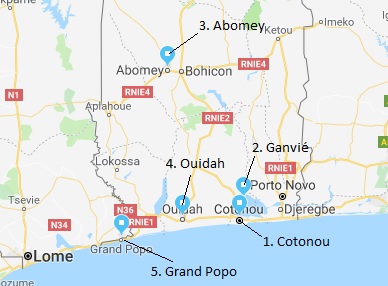
If you have limited time, money, or both, you can still see a lot of wonderful things in Benin during one week. Here is my suggested Benin itinerary for one week! Though I do love jam packed vacations…
If you want to relax a bit more while backpacking in Benin, I would recommend (GASP!!!) skipping Abomey and doing Ouidah as a half day trip while you are on your way from Cotonou to Grand Popo. Then you can chill at the beach if you are looking for more of a relaxed vacation.
Otherwise, this Benin itinerary is fine for a busy week or a more relaxed 8-10 days. Thankfully distances aren’t too long …it’s not like traveling in Southern or Eastern Africa!
I traveled to Togo overland from Benin and so this one week itinerary will be perfect for those of you who want to do the same! Or if you are traveling to Benin from Togo then you can tackle this guide to Benin backwards!
Benin Itinerary Day 1: Arrive and visit Cotonou, Benin’s largest city and port of entry

Located along the coast, Cotonou is the largest city in Benin. It is also where the international airport is located.
It’s not the capital, though! Porto Novo is the capital.
From here, backpackers in Benin can get to anywhere in the country. You can also easily travel to Nigeria, Togo, Niger, ad Burkina Faso from here…though getting visas to all those places may be less easy…
There are a few nice things to see and do in Cotonou, but I admit it isn’t the most exciting city.
I found it more interesting than Togo’s capital Lomé, but you can pretty much see the tourist sights of Cotonou in a day or two.
Cotonou Travel Guide: Visit The Cathedral (Notre Dame des Apotres) in Cotonou is very unique and worth a visit. It is the seat of the Catholic Church in Benin and the pope even visited there! It isn’t too far from the famous Dankopta Market where you can literally wander for hours, people watching and absorbing the atmosphere. The Dankopta Market is also home to an interesting voodoo market, though it is difficult to find. I ended up visiting one in Ouidah.
I read online that people will help you find things in the big market if you give them a little tip, but even after asking around nobody could direct me to the voodoo fetish market. Maybe I was just unlucky. It is apparently in the northern part of Dankopta Market. Go north of the main market building along the shore and keep going (you will pass the empty bottle area). Good luck and prepare to pay for taking photos.
Actually, after asking around for that one really nice man thought he knew exactly what I wanted. He found me a moto and sent me on my way to the Artisanal Center/ Craft Market, which made me laugh because it seems like everyone assumes a white girl wandering around is trying to find the craft market.
The Artisan Market in Cotonou is the perfect place to find souvenirs and trinkets. There are lots of carved, wooden statues and necklaces. The vendors are extremely persistent, though very kind. To tell you the truth I find these sorts of places to feel like tourist traps, but sometimes you can find some gems. The Fondation Zinsou may offer more unique pieces of art if that is what you are looking for.
Lastly, I enjoyed taking walks and wandering around Cocotiers, a nice neighborhood not far from the airport. It was a beautiful neighborhood and not so far from the beach!
If you want more beaches and seafood, don’t miss Route des Pêches, which stretches along the coastline between Cotonou and the west towards Ouidah. There are plenty of fishing villages to explore and of course lots of fresh seafood!
Where to stay in Cotonou, Benin:
After traveling through Benin, Togo, and Burkina Faso, I realized that accommodation can be a little pricey in the region.
Consider booking ahead to be sure you can get the best rates since the budget options do not always have lots of beds available. I will list some popular options in this Benin travel guide.
Also know that the cheapest option may not always be the most secure, or it may be really far outside of the city center. If you just look for the cheapest option on Booking.com like I do, I really recommend double checking the location and reviews!
Guesthouse Cocotiers- This place is where I stayed. It is right by the airport and they offer one of the cheapest dorm options in the region! They also offer private rooms. This is also the place to go if you want to meet other travelers. You meet a lot of interesting people here! One thing I really loved about this place was the staff. They were wonderful and sincerely wanted to help you out. The man at the front desk would always tell me what prices to expect when I took shared taxis or motos around. The staff cooked their own meals in the shared kitchen so I learned all about regional cooking. They even invited me to join them one evening and it was one of the most enjoyable dinners I had during my trip! You’ll meet authentically wonderful people here.
Check out Guesthouse Cocotiers on Booking.com or on Hostelworld .
La Guesthouse Cotonou- This place is the other backpacker hangout in Cotonou. I did not go there personally but it supposedly has affordable rooms and is a great place to meet people. You can read more here on Tripadvisor, but you can’t book it online through a booking site.
Hotel Saint Jean- This is less of a backpacker place but is still clean and affordable and closer to the center of town. Note that accommodation in the region can get really really expensive so I recommend booking in advance if you are traveling to Benin on a budget! You can check out Hotel Saint Jean on Booking.com !
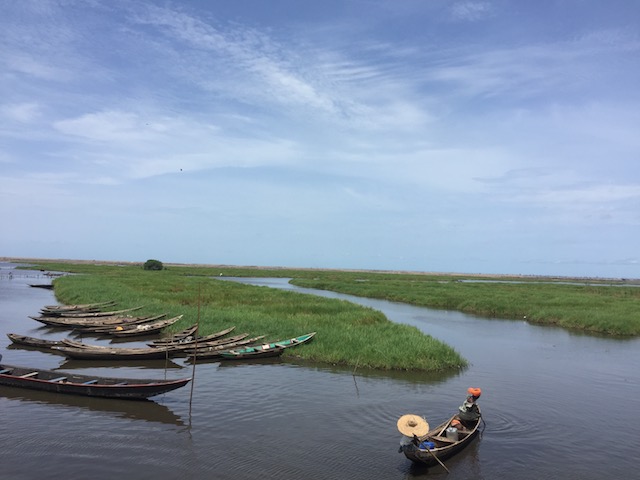
Ganvié is a really special floating village not so far from Cotonou on Lake Nokoué. It is apparently one of the larger floating villages on the continent. It is also known as the Venice of Africa! Visiting there was one of my highlights of traveling in Benin. I would say it is a must in any Benin itinerary!
I felt skeptical before visiting Ganvié because I had read some negative things about tourism in the area online. In the end I decided to go and I was really happy that I did, even if I did run into some problems along the way. I felt compelled to write a more in depth post about Ganvié. You can check it out here if you’re curious.
Otherwise, here’s a mini Ganvié travel guide:
How to get to Ganvié: Take a moto (or a Zem as they call it) to the Étoile Rouge (Red Star monument in the middle of town that is the departure point for plenty of bush taxis that will take you around the region). It should be less than 500 CFA to go there from any point in town.
From the Étoile Rouge, take a shared taxi (taxi brousse) to Calavi for 500 CFA. From there you just walk down the street for about 5 minutes until you get to the launching point for the boats to Ganvié.
How much it costs to visit Ganvié:
To visit Ganvié, you can pay either for a motorboat or a canoe ( pirogue in French). The motorboat tour costs 10,500 CFA and the canoe costs 8000. You also need to pay for a guide/ government fee which turns out to be 4500 CFA. You will also be expected to tip your guide.
It is much more cost effective to go in a group than to go alone.
Keep in mind:
You are visiting a village where people work and live. The people there don’t like being photographed unless you ask. Many will expect some sort of payment.
The tour was interesting in French, though if you do not speak French you may get less out of the tour.
Don’t forget sunscreen! I ended up buying a big straw hat to protect me!
Women traveling alone: try to get an older guide. Unfortunately one theme of my Western Africa trip is that the young guides all seemed to think we were on a date and kept on trying to touch me.
For more details check out my Ganvié post!
Hotels in Ganvié, Benin:
I visited Ganvié as a day trip from Cotonou. It is about a half hour away.
If you are interested there seem to be two hotels in the village.
Hotel Germain has their own boats and they do all their own tours. Therefore you do not need to book a tour at the desk when you arrive to the launching point at Calavi. The only other tourists I saw in Ganvié were affiliated with this hotel. To tell you the truth I wished I had stayed there too by the end of my day trip, especially since I had a bit of a negative experience. You can read more about it or book it here .
Chez Raphael is the other hotel. It is very basic and affiliated with the people giving the tours that independent travelers book. It did look cool, though, but I didn’t bring my things with me. Plus it would have required me to hang out with my guide all evening and he was already giving me the creeps. This place would be awesome if you had some travel buddies. They have a little restaurant, too.
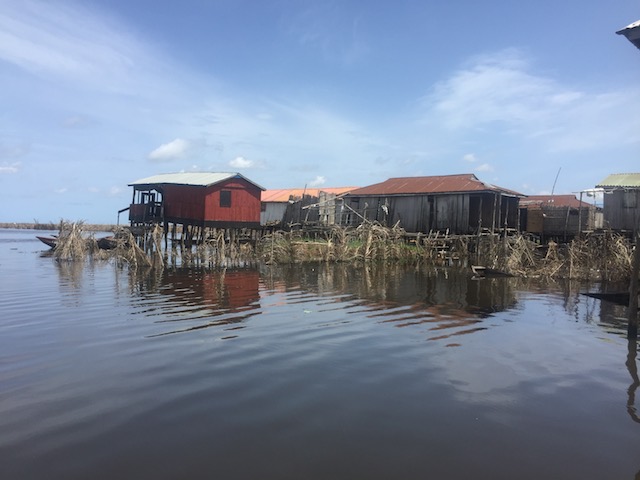
This former capital of the Kingdom of Dahomey is one of the largest tourist attractions in Benin and also is a UNESCO World Heritage site! It is a definite must see in any Benin itinerary! Lots of the original palaces were destroyed when the French invaded in 1892 and the last king burned them as he escaped, but there are still a few standing that are worth seeing if you have the time. There is also an extensive craft market and the Musée Historique d’Abomey was fine.
There are no pictures allowed inside and you pretty much need a guide if you really want to learn about the history of the place. To tell you the truth, the architecture didn’t blow me away. It wasn’t like Tiebele or Bani in Burkina Faso, or even the Tatas in Togo, but the draw of Abomey is the history. But I admit that one day is enough.
Though it really isn’t possible to see in a day trip from Cotonou since sometimes the public transport may not be reliable.
The tour takes an hour or two.
Cost of visiting Abomey
Entrance to the palaces is 2,000 CFA.
Entrance to the museum is 2,500 CFA.
How to get to Abomey
If you are going to Abomey from Cotonou, a bush taxi to Abomey should cost between 2,500 and 3,000 CFA. The drive should take two to three hours but always prepare for it taking longer. You can find the bush taxis to Abomey at the Stade d’Amitié or along Ave Van Vollenhoven near the Gare Jonquet.
But you can pretty much catch any bush taxi going in that direction and they will let you off at least at the town called Bohicon and then you can just find another shared taxi to Abomey! A shared taxi between Abomey and Bohicon should cost 500 CFA. A Zem/moto should cost 1200-1500 CFA. The ride takes around 15 minutes.
You can also technically take a train to Abomey! The trains weren’t running when I was there but that would be my first choice since I love trains! Double check to see if they are running to avoid disappointment. The train runs to Parakou which is farther north. You need to get off in Bohicon and then get a bush taxi to Abomey. It will take longer than a bush taxi.
See also: my tips for taking trains in Africa
Once you are in Abomey you can walk to the museum from the taxi stand. Don’t let the moto drivers rip you off! Though you may have to take one to your hotel. I recommend marking your hotel on google maps before arriving so you can see how far you need to walk!

Places to stay in Abomey
Auberge d’Abomey is the backpacker favorite and their food was pretty good. It was nothing special but clean and just off the main roundabout.
Chez Monique is supposedly a little higher end but simple nonetheless. Someone told me that there are some pretty miserable animals that they keep there and that sort of turned me off to it.
Residence Marie Josee is apparently another nice place in Abomey. I can’t vouch for it personally but apparently people like it and it’s a solid choice.
Also, if you can’t find a place to stay in Abomey, consider looking in neighboring Bohicon. It is just 15 minutes away and they offer some places that can be booked in advance online if you like to do that. For example, the Hotel Canadienne is priced at just 10 euros per night.

Note that you could easily spend two more relaxed days in Ouidah, or you could see a lot in one day as well. If you’re in a rush you can even see the highlights as a stop in between Cotonou and Grand Popo. If you go to the little tourist office in the center of town you can leave your luggage there if you need.
I really liked visiting Ouidah. If I could, I would put it in my top two or three things I did while traveling in Benin. I would say it is a must do in any Benin travel guide and Benin backpacking itinerary!
I think I liked it because of the sheer variety of things to do there. You can learn about the history of the slave trade (Ouidah was once the second most prominent city that provided slaves during the slave trade), or you can learn all about the history of Voodoo in Benin. You can visit typical Beninese markets and see a mixture of colonial and traditional architecture.
Things to see and do in Ouidah, Benin
It seems like tourists generally hire a guide on a Zim/Zem moto to take them around and explain the sights of Ouidah. I did that and I was happy to not have to walk in the suffocating heat. I even saw two other tourists with their driver all on one moto!
When you arrive in town, plenty of young moto drivers will swarm around you and offer tours. I ended up wandering into a little tourism office in the center of town (if you head southeast on Rue Olivier de Montaguerre and turn right on Rue F Colombani you will see it). The man who owns in, Hervé, is a total sweetheart and I really enjoyed spending the day with him. He practices voodoo and is happy to explain the religion and answer questions! Even though he charged a little more than the young Zem drivers on the street were asking (I think I paid 15,000 for the entire day but that included admission and fees for the Temple of Pythons and all other little charges), I was really happy with everything.
But sorry for babbling, here are some things to see and do in Ouida…
The Temple of the Pythons is a voodoo temple where a ton of pythons just hang out. The snakes are sacred and you can learn all about the voodoo traditions and realize that the west’s perception of voodooism is sort of, well, racist. You have to pay an extra fee if you want to take photos.
The Musée de la Fondation Zinsou is a cool art museum in an impressive old colonial home. Like seemingly all museums in the region, a guide will take you around and explain every piece to you. They have a lot of amazing contemporary works by artists from West and Central Africa. You can also enjoy some nice views of Ouidah from the second floor windows.
The Route des Esclaves (the Slave route) follows a slave’s journey from being sold in the market in front of the colonial official’s house to the Door of No Return which is a beautiful monument on the beach that honors and remembers these slaves. Along the way there are many stops where there are statues that symbolize the various ways the slaves suffered before even leaving the continent. It is a sobering experience. One practicality is that if you want to walk the route be sure to take sunscreen and note that the path to the ocean would take a solid chunk of time to do on foot. If you hire a Zem just for the Slave Route apparently it should cost somewhere between 4,000 and 6,000 CFA.
The Sacred Forest of Kpasse is dotted with bronze statues, the Portuguese Fort is a history museum, and the Catholic Basilica is painted baby blue and is just across the street from the Temple of the Pythons. There’s a nice little restaurant next to it called Amicale. The colonial architecture in the center of town and in the outskirts is pretty interesting, and don’t forget to notice the Brazilian Quarter with its brightly colored houses.
The Market near the basilica and temple is less chaotic than in Cotonou and was enjoyable. They have a lot of herbs and objects used in voodoo rituals. If you want to see the animal parts used in the rituals, you need to exit the market building and go down the road on the right (if you are facing the market entrance). You have to pay if you want to take a photo, but they’re open to haggling.
Traditional salt collecting happens just outside of town in the marshes near the ocean. You can see the women working while on your way to the Door of No Return. You can go to these villages and learn about how they collect the salt.
How to get to Ouidah
How to travel to Ouidah from Cotonou: You can pretty much take any bush taxi going on the main highway towards Togo. I got one from the Etoile Rouge no problem. It takes about an hour and cost soomething like 1,500 CFA. You can also get them from the Gare de Jonquet.
How to travel to Ouidah from Grand Popo or from Togo: Just go along the main highway that leads to Cotonou and grab a bush taxi from there.
How to travel to Ouidah from the north (for example how to get to Ouidah from Bohicon or Abomey): Take any Bush Taxi heading south on RNIE2 towards Cotonou. You can either change at Cotonou or change bush taxis at Allada to go directly to Ouidah.
Also NOTE that these bush taxis don’t often go into Ouidah. Instead, they drop you off at the highway turnoff for Ouidah. I was waging a personal war against aggressive Zem drivers and stubbornly decided to walk this route myself. It was a bad idea and took something like 45 minutes just to walk into town. Better to take a Zem.
Where to stay in Ouidah
Note that a lot of the hotels for Ouidah that you will see on online booking sites are located by the beach. This means that you can’t really walk into town from them and would need to take a Zem/moto. This also means that you can’t really walk to them when you arrive by bush taxi. But I mean who doesn’t like a hotel by the beach! Just be aware that some hotels will be sometimes 10 km from the center of Ouidah.
Also, as with most beachfront hotels in West Africa, you can’t really swim in the ocean unless you really want to drown. There are some places where it is fine, but the currents are really strong. But you can’t visit Benin without visiting the beach! It’s a must do for any Benin travel itinerary.
Hotel de la Diaspora (Jardin Bresilien) – This is the most popular budget hotel near Ouidah. It definitely had a family beach resort vibe to it. It is located on the beach and you are sure to meet other travelers here.
Casa del Papa – This is the higher end (though not the most expensive) beachfront hotel. It is around 80 Euros a night, but I would totally splurge if I had a travel buddy to split the room with!
Le Jardin Secret – This is NOT a beach hotel and is located right in the center of Ouidah. It’s like a little oasis and the restaurant is worth a visit even if you aren’t staying in the hotel. It is slightly cheaper than Hotel de la Dispora, and you won’t have to pay for Zems to and from the beach.
Benin itinerary Day 6-7: Grand Popo: Beautiful Beach Heaven
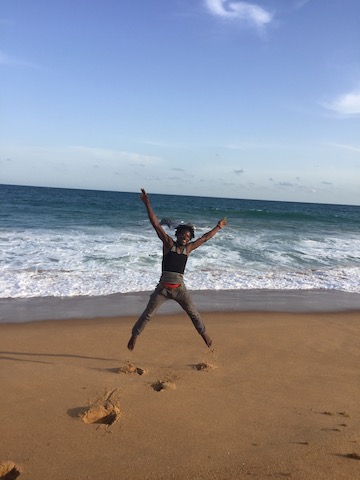
I loved Grand Popo. If you go during the off season, you will get the magnificent beach all to yourself. The beach is very clean- you won’t be avoiding glass and cigarette butts while walking on it. Hang out in a hammock listening to the ocean breeze. Stuff your face with enormous, freshly caught prawns. Go for a walk and see the fishermen fold their impressive nets next to their wooden boats at the end of a long day.
Grand Popo doesn’t feel commercialized like other beach hot spots on the continent. If you are seeking peaceful solitude after your adventurous backpacking trip to Benin then this is your place.
But then again it may turn into a complete zoo during the high season…so take my poetic musingsin this Benin travel guide and Benin Itinerary with a grain of salt. I was just in heaven to be at a beach and not be chased around by aggressive vendors or children demanding candy (tourists, can you please stop giving random children candy? pleeease?).
Lastly, you can’t really swim in the ocean at Grand Popo. There are no water sports or activities like snorkeling, and that is probably what keeps this place so quiet. I mean, it isn’t forbidden to swim and plenty of locals do it, but the ocean does not look welcoming! Even if you are a strong swimmer, there’s at least one big rusted out shipwreck (apparently the work of Nigerian pirates in the 80s) not far from the shore that looks sharp and unwelcoming among the waves…I hope you had a tetanus shot!
Things to do in and around Grand Popo
Other than being lazy next to one of Benin’s best beaches , there are some activities that more energetic people can do in the area. You could take a pirogue (canoe) trip up the river for about 2 hours (should cost between 5000 and 7000 CFA) , or take a motor boat all the way to where the river meets the ocean , called the Bouche du Roy. The motor boat becomes pricey very quickly (they were quoting something like 55,000 CFA for a day trip), and so if you are traveling alone you may have to find some friends to split the cost. There’s also the Villa Karo cultural center that’s worth a visit.
Nearby, there is Lac Ahémè, where you can see more women collecting salt or learn about other traditional fishing and farming methods of Benin . You generally need a guide to do some of these activities, but every hotel will have a relationship with a trustworthy guide. You can generally book these things a night in advance when you arrive.
How to get to Grand Popo
Any bush taxi going in between Cotonou and the Togolese border will be able to drop you off at Grand Popo. If you are outside of Cotonou, you can just flag down any bush taxi passing by on the national highway. In Cotonou, you can find these cars at the Etoile Rouge, Stade de l’Amitié, or Gare Jonquet.
Note that the hotels are spread out along the beach. I would check on Google Maps to see how far your hotel may be from the highway. You may need to take a Zem to travel those last final kilometers to arrive at your hotel!
Grand Popo is literally a simple turnoff from the highway and the streets are pretty sparse. If you aren’t vigilant your bush taxi could just pass it by!
The drive should take 2 hours from Cotonou, and 45 minutes from Ouidah. Grand Popo is only 20 km east of the craziness of the border with Togo. It is a great final stop in Benin before heading to Togo, or a great first stop in Benin if you are coming from Togo.
I hope you really consider adding Grand Popo to your Benin travel Itinerary!
Where to stay in Grand Popo:
Coco Beach Chez Mathias- I stayed here and it had a very chill, rasta vibe. You get your own bungalow on the beach and there were plenty of hammocks. It was simple but exactly what I was looking for. Also the giant prawn curry I had there was the best meal I ate in Benin! A good, budget option.
Auberge de Grand Popo and Awale Plage are both a little more expensive but they offer swimming pools for those of you who had your heart set on swimming somewhere during a beach trip. Both have excellent restaurants as well so you can’t go wrong.
Lion Bar- The main rasta hangout in Grand Popo. This place lets you camp for those of you who are on a shoestring budget. Definitely the backpacker hangout.
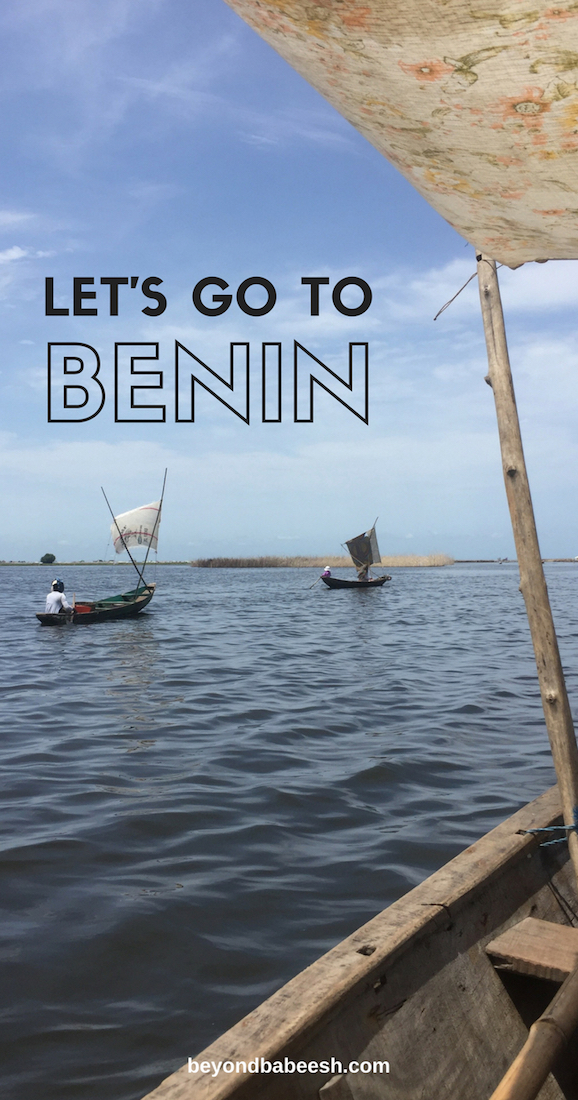
Porto Novo is the capital of Benin, and it is a stark contrast from the craziness of Cotonou. It is also just around 45 minutes away! This used to be the center of the Gun people’s kingdom, and it was renamed after Porto, Portugal when the Portuguese made it into a slave trading center.
For those of you who want to spend less time on the road, you can swap Abomey for Porto Novo in the one week Benin itinerary.
Things to see and do in and around Porto Novo:
There is a totally wacky, awesome Grand Mosque in Porto Novo that you cannot miss. No Benin travel guide would be complete without mentioning this mosque! It was built in 1912 by the Brazilian community in Benin and it was based off of the baroque style of colonial churches in Brazil. That’s right. So the Christian church style went from Portugal, to Brazil, and then to Benin where it was used to build a Muslim place of worship. Pretty crazy(and sad because of, well, colonialism and slavery…)! The Musée Honmé is the former palace of King Toffa and a peek into the end of that traditional royalty with a focus on a special musical instrument, which was really cool.
The Musée Ethnographique de Porto Novo will introduce you to the tribal customs and traditions of the region. It also is in a cool old colonial building. The Centre Songhai is a research and teaching center for sustainable farming. They give one hour tours if you are interested in that. You can also stay there since it has an auberge. The Musée de Silva celebrates the Afro Brazilian community and also is known for showing films outside! Check to see what they have going on!
Just outside of Porto Novo (maybe 8km) there is a cool market that is held every 4th day in Adjarra. The market is known for the local drum makers and you can find a ton of awesome musical instruments! Apparently you can buy from over 50 different kinds of Tam Tams, so this would be a drummer’s dream! You can find bus taxis going to Adjarra from the Gare Routiere near the bridge or take a moto.
Also, there are apparently much less touristy Stilt Villages (like Benin’s famous Ganvié) that you can visit from Porto Novo. Apparently Aguégué is a nice village to visit around 10km from town. I did not go personally so I can’t vouch for it, but I asked about prices and apparently you can find someone to row you there in a pirogue (takes around 4 hours) from the bridge. Or you can plan ahead with Iroko tours or through the Hotel Beaurivage that should cost between 6,000 and 8,000 CFA per person in a canoe or slightly more for a group in a motor boat.
Porto Novo is great and I hope you really consider additing it to your Benin itinerary.
How to get to Porto Novo/ How to get to other destinations in Benin and Nigeria from Porto Novo
To get to Porto Novo from Cotonou, you can find bush taxis at the Gare Jonquet or the Gare du Dantokpa. It takes around 45 minutes and should cost around 700 CFA. You could probably find a bush taxi at the Etoile Rouge if you just ask around.
To get to Cotonou from Porto Novo you can find a bush taxi in front of the Ouando Mosque or at the Carrefour Catchi.
To get to Natitingou buses also leave from near the Ouando Mosque.
The Gare Routiere is close to the bridge not so far from Musée da Silva. You will also be able to find transport to Cotonou and to Nigeria from there. Note that bush taxis to Nigeria will most likely stop at the border and you will need to find transport after crossing the border. I usually make a friend on the bus who walks with me through the process and helps me not to be ripped off too much!
Where to stay in Porto Novo
Since Porto Novo is just 45 minutes from Cotonou, you can see a lot as a day trip. Just remember that the sun sets at around 6pm so you will have to get an early start! But it is a good thing that Benin is so small! You won’t spend all your time traveling in Benin cooped up in a bus.
Résidences Ouadada is a much beloved hotel that doubles as a cultural center in Porto Novo. It’s a good deal if you’re sharing a room!
Beaurivage is a little nicer and slightly more expensive. The plus is that you can organize tours to the local stilt/floating villages here!
Le Centre Songhai is a cool option for people on a tighter budget. It’s 3 km north of town and, like stated above, it is a research and teaching center for sustainable farming. You are bound to meet some interesting people there!
Musée da Silva also has a run down auberge.
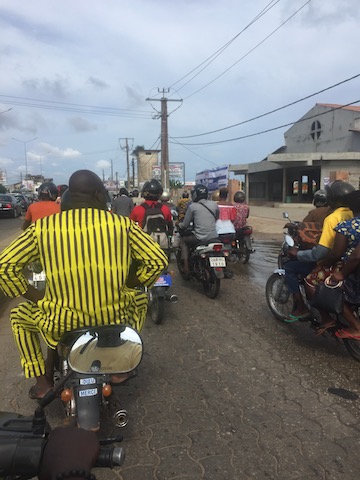
Days 6-9 (or longer): Check out a national park and go on a safari in Benin!
There are two National Parks that are home to big cats, elephants, and plenty of other herbivores in the far north of Benin. They are Pendjari National Park, which is known to be one of the best national parks in West Africa, and the more isolated Parc National du “W” du Niger.
Although personally I feel like the best safaris are to be had in Southern and Eastern Africa, the sheer remoteness of these parks makes them attractive destinations in any Benin itinerary. You won’t see elephants in a density that you may see in Zambia , but seeing a wild elephant in any context is special.
Just note that visiting the parks may be difficult/impossible in the rainy season so be sure to plan ahead and know about the road conditions. But going in the rainy season means there will be fewer tourists, even if that also means there will be fewer animals.
Also, for this Benin travel guide, it is totally possible to do a budget safari in Benin to Pendjari National park. Costs start to go up if you want to go to the Parc National du “W”.
This park is more straightforward to visit for a Benin travel itinerary. If you can get to Natitingou you can book a 4×4 and park guide from there. This is probably the easiest and most comfortable option. Hotel Tata Samba is on the main road in Natitingou and a place where you can easily organize a trip. Auberge le Vieux Cavalier is a cheaper option where you can also book 4x4s. Expect to pay around 65,000 CFA/day for a 4×4 car with a driver/ guide. You will also have to pay for the Pendjari National Park entrance fee of 10,000 CFA per person, a 3,000 CFA car entrance fee, and a possible 5,000 more for a guide.
How do you travel to Natitingou from Cotonou? Try the ATT bus near the Etoile Rouge in Cotonou. You can also find plenty of bush taxis heading that direction, though you may need to change a few times.
So you can also go on a budget safari in Benin for even cheaper, you just have to take public transportation to Tanguieta and book your 4×4 and park guide there.
Park guides are given an A, B, or C ranking, and so be sure to get someone with an A to ensure a good experience. Official guides will have an official identity card for the park with the rating on it that you can ask to see.
To find said guide you can pretty much ask any driver and soon you will be at someone’s doorstep or corner store.
Tanguieta is the last town before the park gate. There are plenty of places to stay there, such as Le Baobab or the slightly seedier APP Bar-Dancing. It will be slightly cheaper to book your budget safari in Benin from there since you don’t have to spend time driving in your private car from Natitingou.
Also be sure to stock up on supplies in Tanguieta. Expect European prices for simple meals in the park, so for your budget safari I recommend stocking up on peanut butter and snacks before entering Pendjari National Park.
With all budget safaris, camping outside the park is the cheapest option since you don’t need to pay fees every day. But the downside with staying outside the park is that you may miss the early morning game drive, which is the best time to go!
But if you do stay in the park, for the purpose of this Benin travel guide, here are the popular places to stay:
The park gates close at 18:00 so remember that if you are staying in the park you have to plan to arrive before dark.
Pendjari Lodge: Your more classic lodge option. Not quite a budget safari place but you pay for the nice ambiance! Check out their website for more info and prices (About 100 Euros a night depending on the season).
Hotel Pendjari : A slightly cheaper and still popular option within the park.
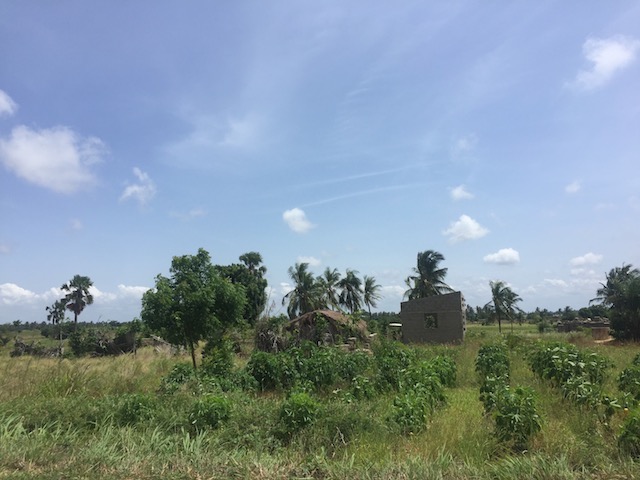
A safari in the Parc National du “W” du Niger: a little less budget friendly, a lot more isolated.
This park in the north of Benin is much more isolated. It is named for the “W” shape of the Niger river. Apparently the park is more developed in the Burkina Faso and Niger sides (the park is a trans frontier park).
Note that the “W” will have the French pronunciation of “doblé veh”.
Expect to pay a minimum of 17,000 CFA per day just for park entry fees and taxes. This includes the fee for each person’s entry, a mandatory guide fee, and the car fee. You must enter the park with a 4×4 vehicle and you will not be allowed to enter on foot.
You can take public transportation up to the town Kandi and possibly try to book a 4×4 there (if you do not have your own). Note that the park fees do not cover the fee of hiring your own car and driver and gas.
You can try to organize things at the Auberge de Kandi where you can also apparently book accommodation within the Parc National du “W” du Niger in advance.
The easiest entry will be to then go to Banikoara from Kandi. There is simple, inexpensive accommodation in Banikoara. From there you go to Kérémou to enter the park.
Full disclosure: I did not go to this park and am acting based on information other travelers gave me. After traveling all around the region I knew that it would end up being a huge expense to do it alone. The park entry fees are fine, it’s just hiring a 4×4 and driver as a solo traveler in Benin would have been out of my price range
Lastly, double check if it is safe to travel in this isolated area of Benin when you are in the country. I know that this National Park is sometimes considered “off limits for tourists” in neighboring Niger, but this doesn’t always apply to the Benin side of the park.
Tatas are traditional, fortress-like houses built by the Somba (also known as Batammariba or Tammari) people of northwestern Benin and northern Togo. You can see the tatas in both Benin and Togo, but the Benin side is much nicer to visit.
This is probably one of the coolest things to do in this Benin travel guide!
If you happen to be taking a bush taxi between Djougou and Natitingou , you are bound to see the Tatas dotting the countryside, but the highest concentration of tatas is between Natitingou and Boukoumbé .
(Also, as listed above in the Pendjari National Park section, Hotel Tata Samba and Auberge le Vieux Cavalier are good hotel choices for Natitingou.)
Boukoumbé is near the Togolese border. Some people like to see the tatas in both countries, but know that if you cross into Togo you have to pay the entrance fee to see their tatas and (sorry not sorry) it seems like a ton of thugs run the tata tourism over in Togo.
Also! This is important, if you cross into Togo from Boukoumbé or vice versa, you MUST get your passport stamped in Natitingou as they do not have the stamping facilities at the border.
You can easily get to Boukoumbé from Natitingou to see the tatas on market days. Apparently it is always the day before Natitingou’s market day. But on an off day you can take a momo/ Zem there. That will require some haggling but will cost you between 5,000 and 10,000 CFA depending on how good you are!
Visits to the villages and tatas in the region can be organized from hotels near Boukoumbé. You can also just ask around and possibly find a driver for the day.
Some local hotels and auberges near boukoumbé include:.
Otammari Lodge : Stay in a hotel that is a tata! It’s a rustic eco lodge that is right on the road to Boukoumbé. This place is also known as La Perlede de l’Atakora
Tata Koubetti Victor: You stay in a local Tata that has turned into a hotel and restaurant/bar. They also offer excursions in the region and you can see their offerings and full price list at their website here !

I wanted to write about entering Togo in this Benin travel guide.
If you cross from the less popular border in the north near Boukoumbé, remember that you will need to do your border formalities at the police station in Natitingou!
The Togo-Benin border in the south that connects Cotonou with Lomé is a pretty straightforward border. The bush taxis that come from both Lomé and Cotonou do not cross the border. You need to get out and walk. Don’t listen to the moto drivers saying they need to drive you farther because it is a very easy walk.
If you are crossing the Benin-Togo border from the Benin side, you get your exit stamp from the office to the left before you cross.
When you enter Togo, you have the option to buy a visa. They also check your yellow fever certificate. They actually give out the vaccinations at the border for the equivalent of 10 euros or something…ughhhh why did I pay 60 euros in France for the same thing?!
Once you exit Benin and arrive in Togo, keep walking straight. They do a sort of customs check which involved a hoard of men making fun of me and trying to get me to give them peanuts. If your Benin itinerary includes a jaunt into Togo, don’t forget to get a multiple entry visa to Benin.
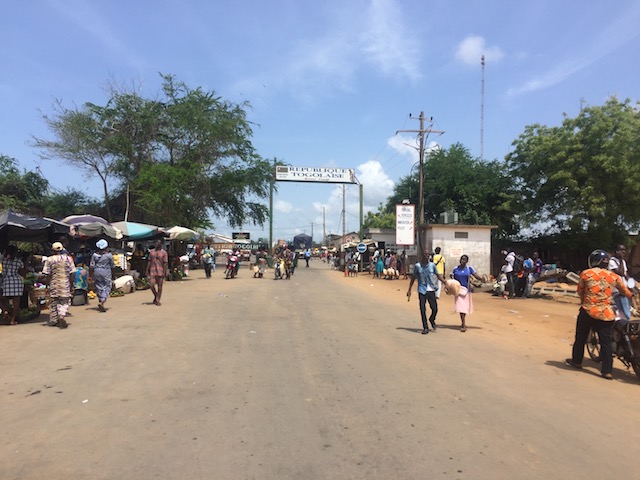
I hope that this guide to Benin will help you plan a wonderful trip!
Related posts:.
- My experience traveling to West Africa with the Visa Touristique Entente
- Benin: Know Before You Go- Visas, My Travel Tips, and Advice
- Solo Female Travel in Benin: Is it Safe to Travel to Benin Alone?
8 of the Absolute Best Things to do in Cotonou, Benin
Related posts.

7 of the Absolute Best things to do in Ouagadougou, Burkina Faso
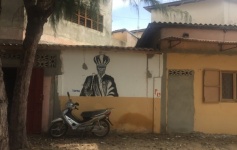
7 of the Absolute Best Things to do in Lomé, Togo
I found this blog useful as it covers the vital information on the Benin Visit. Good to read such a well written blog post.
- Pingback: Benin: Know Before You Go- Visas, My Travel Tips, and Advice
- Pingback: 7 of the Absolute Best Things to do in Lomé, Togo
- Pingback: 8 of the Absolute Best Things to do in Cotonou, Benin
Save my name, email, and website in this browser for the next time I comment.
Cookies on GOV.UK
We use some essential cookies to make this website work.
We’d like to set additional cookies to understand how you use GOV.UK, remember your settings and improve government services.
We also use cookies set by other sites to help us deliver content from their services.
You have accepted additional cookies. You can change your cookie settings at any time.
You have rejected additional cookies. You can change your cookie settings at any time.
- Passports, travel and living abroad
- Travel abroad
- Foreign travel advice
Entry requirements
This information is for people travelling on a full ‘British citizen’ passport from the UK. It is based on the UK government’s understanding of the current rules for the most common types of travel.
The authorities in Benin set and enforce entry rules. If you’re not sure how these requirements apply to you, contact the Beninese Embassy in France (in French).
COVID-19 rules
There are no COVID-19 testing or vaccination requirements for travellers entering Benin.
Passport validity requirements
Your passport must be valid for the duration of your stay.
Check with your travel provider that your passport and other travel documents meet requirements. Renew your passport if you need to.
You will be denied entry if you do not have a valid travel document or try to use a passport that has been reported lost or stolen.
Visa requirements
You must have a visa to enter or travel through Benin.
For further information on entry requirements, contact the Beninese Embassy in France (in French).
Applying for a visa
Apply for a Benin visa online at least 7 days before your arrival date. You will get your visa when you arrive at Cotonou airport.
Visas for Nigeria, Ghana and Togo
You cannot get entry visas for Nigeria, Ghana or Togo in Benin. For onward travel you must apply for visas before travelling to Benin.
Vaccine requirements
To enter Benin, you must have a certificate to prove you’ve had a yellow fever vaccination.
For more details about health entry requirements and recommended vaccinations, see TravelHealthPro’s Benin guide .
Customs rules
There are strict rules about goods you can take into or out of Benin (in French). You must declare anything that may be prohibited or subject to tax or duty.
Related content
Is this page useful.
- Yes this page is useful
- No this page is not useful
Help us improve GOV.UK
Don’t include personal or financial information like your National Insurance number or credit card details.
To help us improve GOV.UK, we’d like to know more about your visit today. We’ll send you a link to a feedback form. It will take only 2 minutes to fill in. Don’t worry we won’t send you spam or share your email address with anyone.
Global site navigation
- Celebrities
- Celebrity biographies
- Messages - Wishes - Quotes
- TV-shows and movies
- Fashion and style
- Capital Market
- Family and Relationships
Local editions
- Legit Nigeria News
- Legit Hausa News
- Legit Spanish News
- Legit French News
Pelumi Nubi: Cute videos as solo London-to-Lagos driver finally arrives Nigeria
- The excitement is still very much on over the arrival of Pelumi Nubi, the London-to-Lagos solo driver
- Nubi arrived Nigeria on Sunday, April 7, as reported by Governor Babajide Sanwo-Olu's media aide, Gboyega Akosile
- Nubi, who has been in a trip for 68 days, arrived the Nigeria-Benin Republic border where she was received into the country by the Lagos state government
PAY ATTENTION: The 2024 Business Leaders Awards Present Entrepreneurs that Change Nigeria for the Better. Check out their Stories!
Lagos - Pelumi Nubi, the 28-year-old travel content creator, who embarked on a solo road trip from London has arrived in Lagos after over two months.
Nubi was received at the Nigeria-Benin Republic border by the Lagos state government on Sunday, April 7.
The young Nigerian was welcomed into the state in persons by the commissioner of Tourism, Arts and Culture, Toke Benson-Awoyinka and the special adviser, Tourism, Arts and Culture, Idris Aregbe, The Nation reports.

Tinubu’s Wife, Uzodimma, others present as influential APC Gov’s daughter weds lover

She began her journey on January 31 facing various obstacles along the way.
PAY ATTENTION: Click “See First” under the “Following” tab to see Legit.ng News on your Facebook News Feed!
Her arrival was announced on Sunday by Gboyega Akosile, special adviser, Media and Publicity to Governor Babajide Sanwo-Olu.
Akosile tweetd :
“Lagos State Government gives a hero’s welcome to @peluminubi_, a Nigeria-British citizen who who did a solo drive from London to Lagos.
“Pelumi was received at the Nigeria-Benin Republic border on behalf of Lagos State Government by the Hon Commissioner of Tourism, Arts and Culture, Mrs Toke Benson-Awoyinka and the Special Adviser, Tourism, Arts and Culture @IdrisConnecting.
"Welcome home!”
See videos that captured moments when Nubi was received in the tweet below:
Read more on Pelumi Nubi:
- "Pray For Me": Pelumi Nubi, the Lady Driving From London to Lagos Involved in Accident
- "Finally Happening": Nigerian Lady Pelumi Nubi Begins Driving from London to Lagos in Video
- "She is Lean Now": Lady Driving From London to Lagos Arrives in Ghana, Headed For Nigeria April 7

President Tinubu Leaves Abuja For Lagos To Celebrate Eid-el-Fitr
"I Can't Do this Anymore": Lady Driving Car from London to Lagos Cries over Problem in Sierra Leone
Pelumi Nubi, the lady travelling from London to Lagos by car, had lamented being denied entry into Sierra Leone, a country in West Africa .
In a touching video, Pelumi wept in her car, saying she was so tired and "can't do this anymore."
PAY ATTENTION: Donate to Legit Charity on Patreon. Your support matters!
Source: Legit.ng

VIDEO: London-to-Lagos solo driver, Pelumi Nubi receives hero’s welcome in Nigeria
A 28-year-old travel content creator, Pelumi Nubi, has completed her solo road trip from London, United Kingdom, to Lagos, Nigeria.
The Special Adviser on Media and Publicity to the Lagos State Governor, Gboyega Akosile, announced her arrival via his X account on Sunday.
He said the Lagos State Government welcomed Nubi, a Nigerian-British citizen, who undertook the solo drive at the Nigeria-Benin Republic border.
He wrote, “Lagos State Government gives a hero’s welcome to peluminubi_ , a Nigeria-British citizen who who did a solo drive from London to Lagos.
“Pelumi was received at the Nigeria-Benin Republic border on behalf of Lagos State Government by the Commissioner of Tourism, Arts and Culture, Mrs Toke Benson-Awoyinka; and the Special Adviser, Tourism, Arts and Culture, Idris Aregbe. Welcome home!”
Nubi embarked on her solo trip in a car on January 30, 2024.

IMAGES
VIDEO
COMMENTS
Requirements For visiting Benin Republic from Nigeria. For Nigerians planning on visiting Benin Republic, the following are the requirements: Nigerian Passport: Nigerians visiting Benin Republic will have to present their International Passport at the border. The Nigerian International Passports is a document issued by the Nigerian Immigration ...
Nigerian citizens do not need a tourist visa when travelling to Benin in 2024. Nigerian passport holders can stay in Benin for a short period of time (for 90 days). Please, read all the information below to make your trip easy and safe. Don't rely on information from only one source. Please, with at least one more source listed in the link.
Rome2Rio makes travelling from Nigeria to Benin easy. Rome2Rio is a door-to-door travel information and booking engine, helping you get to and from any location in the world. Find all the transport options for your trip from Nigeria to Benin right here. Rome2Rio displays up to date schedules, route maps, journey times and estimated fares from relevant transport operators, ensuring you can make ...
Rome2Rio makes travelling from Lagos to Benin easy. Rome2Rio is a door-to-door travel information and booking engine, helping you get to and from any location in the world. Find all the transport options for your trip from Lagos to Benin right here. Rome2Rio displays up to date schedules, route maps, journey times and estimated fares from relevant transport operators, ensuring you can make an ...
Call us in Washington, D.C. at 1-888-407-4747 (toll-free in the United States and Canada) or 1-202-501-4444 (from all other countries) from 8:00 a.m. to 8:00 p.m., Eastern Standard Time, Monday through Friday (except U.S. federal holidays). See the State Department's travel website for the Worldwide Caution and Travel Advisories.
Nigerians need a valid Nigerian or ECOWAS passport (ECOWAS travel certificate) to cross the Bènin Republic border. You can get an ECOWAS passport at any immigration office for N25,000. Because the process is manual, you can get it within 3 hours. (I heard that if you are going by boat, they'll only ask for a valid ID.)
Most drivers only take you up to the seme border where you get a different vehicle to take you inside Benin - this is the cheaper option. If you prefer have 1 driver to take you straight from Lagos to Benin then expect to pay upwards of N120,000 each way. This is because they unlike other drivers, they are spending more money on fuel.
A boat on the beach in Ouidah, Benin Republic. Sure, there's more than one way to travel from Lagos-Nigeria to the Republic of Benin: you could take a road trip all the way from Lagos to the Seme-Krake border, or take a boat from Lagos to Badagry and take a bus from there to Seme-Krake border.
Having spent 4 days in Cotonou and Ouidah, I can confidently recommend the top 10 things to see & do in Benin Republic. Keep reading! Benin Republic is the most accessible country to visit from Lagos, Nigeria. Although the roads and multiple police stops along the way are tedious, within… November 5, 2023. In "Benin Republic"
2. A yellow fever certificate is vital. This is mandatory while traveling in African countries and also in some parts of Asia. All visitors traveling to Benin need a yellow fever certificate and you will be refused entry without one. Proof of this vaccination is also required during your application for a visa.
Hi guys, in this video I shared how to travel to Benin Republic from Lagos, Nigeria on a budget.It's a safe means of transportation and very legal.Travel to ...
Recommended for unvaccinated travelers of all ages traveling to Benin. CDC recommends that travelers going to Benin take prescription medicine to prevent malaria. Depending on the medicine you take, you will need to start taking this medicine multiple days before your trip, as well as during and after your trip.
It is the fourth-largest city in Nigeria according to the 2006 census, after Lagos, Kano, and Ibadan. It is situated approximately 25 mi north of the Benin River and 200 mi by road east of Lagos. Benin City is the centre of Nigeria's rubber industry, and oil production is also a significant industry. - Wikipedia. Things to do in Benin City
You can chat us on whatsapp +229 67249558 for any information or question. Travelling from Nigeria to Cotonou (Benin Republic). The road map to Benin Republic guide for students, businessmen and visitors.From wherever location you tend to find yourself, be it the north, east, west or south, all you need to do is travel from your location to Lagos.
Read the entire Travel Advisory. Do Not Travel to: The northern regions of Benin, including: Violent crime, such as armed robbery and assault, is common in Benin. There is a risk of maritime crime, including violent attacks and kidnapping at sea, in the Gulf of Guinea. Terrorists continue plotting attacks in Benin.
Benin Republic is a small country in West Africa that shares borders with Nigeria to the east and Burkina Faso and Niger to the north. Lagos is the largest city in Nigeria and is a major transportation hub for the region, making it a popular entry point for those traveling to Benin Republic. ... The most common and affordable way to travel from ...
If you choose to drive in Bénin: always drive defensively. plan your trip in advance, especially if you're visiting a rural area. avoid traveling after dark, especially: on the freeway along the coast; in areas close to the Togo and Nigeria borders; on the road between Cotonou and Parakou.
Eastern Benin. FCDO advises against all but essential travel to the area between the Interstate Highway (RNIE) 2 from Tchaourou to Malanville and the Benin-Nigeria border, due to increasing ...
Backpacking in Benin: a Two to Three Week Benin Itinerary. Benin Travel ItineraryDays 1-2: Cotonou, Ganvié (see above) Day 3: Porto Novo: Leafy Streets and Colonial Architecture. Benin Itinerary Days 4-5: Abomey (see above) and head north. Days 6-9 (or longer): Check out a national park and go on a safari in Benin!
Visas for Nigeria, Ghana and Togo You cannot get entry visas for Nigeria, Ghana or Togo in Benin. For onward travel you must apply for visas before travelling to Benin.
Pelumi Nubi, the 28-year-old travel content creator, who embarked on a solo road trip from London has arrived in Lagos after over two months. PAY ATTENTION: Follow our WhatsApp channel to never miss out on the news that matters to you! Nubi was received at the Nigeria-Benin Republic border by the Lagos state government on Sunday, April 7. The ...
Twenty-eight-year-old UK-based Nigerian travel content creator and solo driver, Pelumi Nubi, who embarked on a road trip from London, United Kingdom to Nigeria has arrived in Lagos. Nubi embarked ...
Pomp and pageantry was rolled out by Lagos State Government on Sunday, to receive a Nigeria-British citizen, Pelumi Nubi, at the Nigeria-Benin Republic, Seme border.
Published. on. April 5, 2024. By. Mike Oyebola. The Super Eagles will take on Benin Republic in a 2026 FIFA World Cup qualifier at a neutral venue. The Confederation of African Football, CAF, has ...
A 28-year-old travel content creator, Pelumi Nubi, has completed her solo road trip from London, United Kingdom, to Lagos, Nigeria.The Special Adviser on Media and Publicity to the Lagos State ...
The opposition will do everything to produce the next president of the Benin Republic. The country should pray against explosions and attacks. I see a change in the service chiefs.
#NewsTonight | 5th April, 2024 Anchor: Natalie Fort #GHOneNews #GHOneTV
Rome2Rio makes travelling from Benin to Nigeria easy. Rome2Rio is a door-to-door travel information and booking engine, helping you get to and from any location in the world. Find all the transport options for your trip from Benin to Nigeria right here. Rome2Rio displays up to date schedules, route maps, journey times and estimated fares from relevant transport operators, ensuring you can make ...